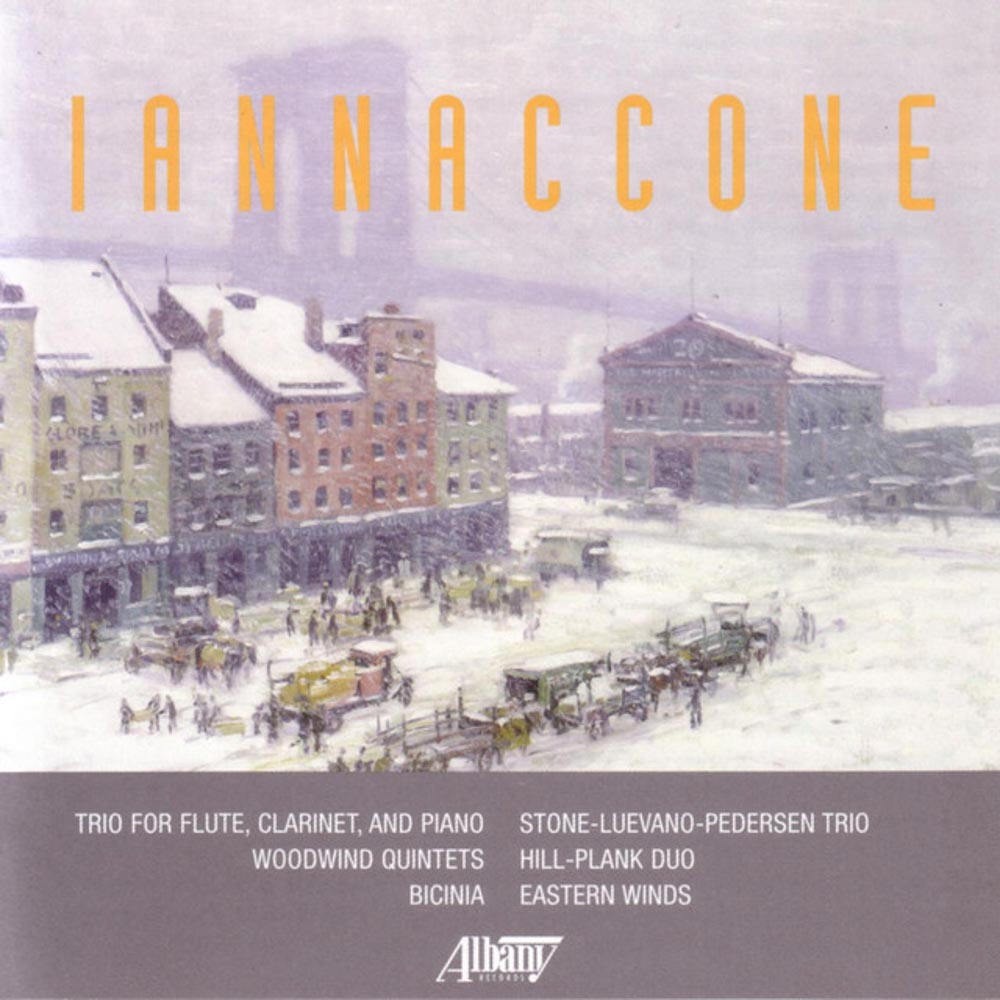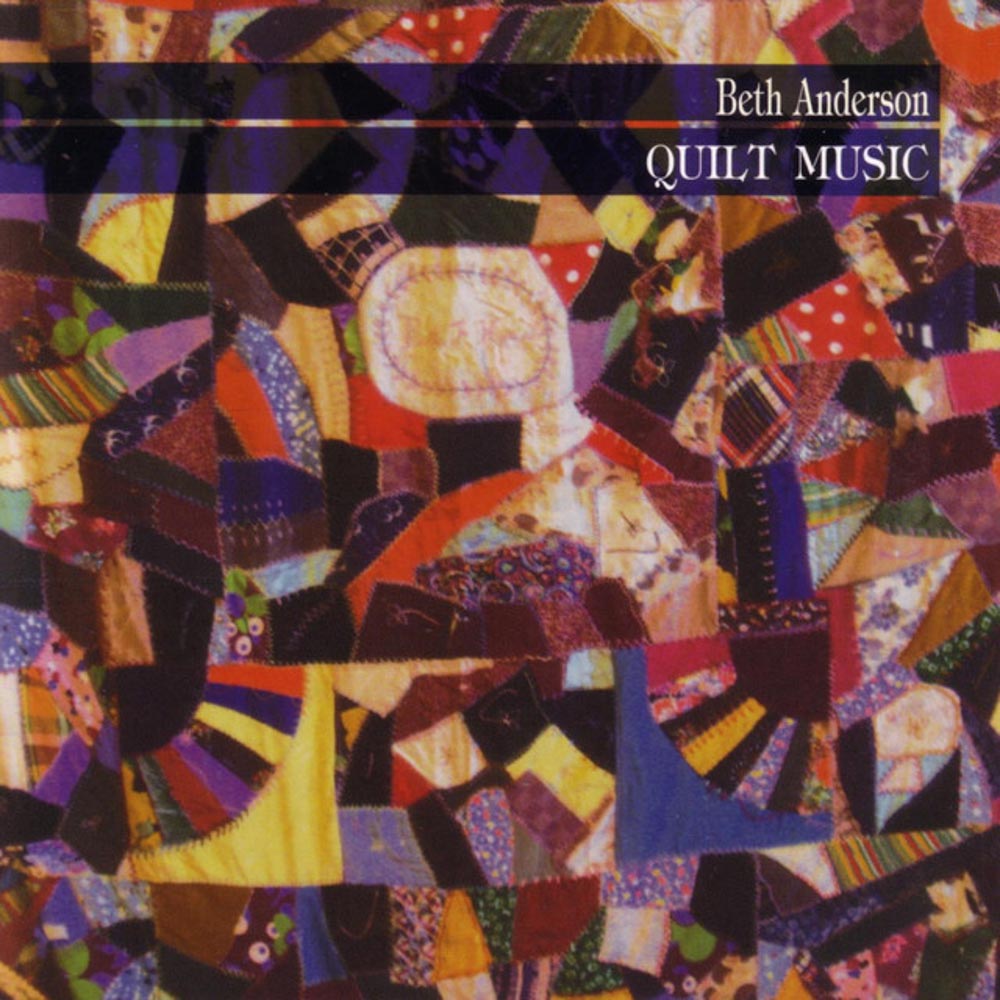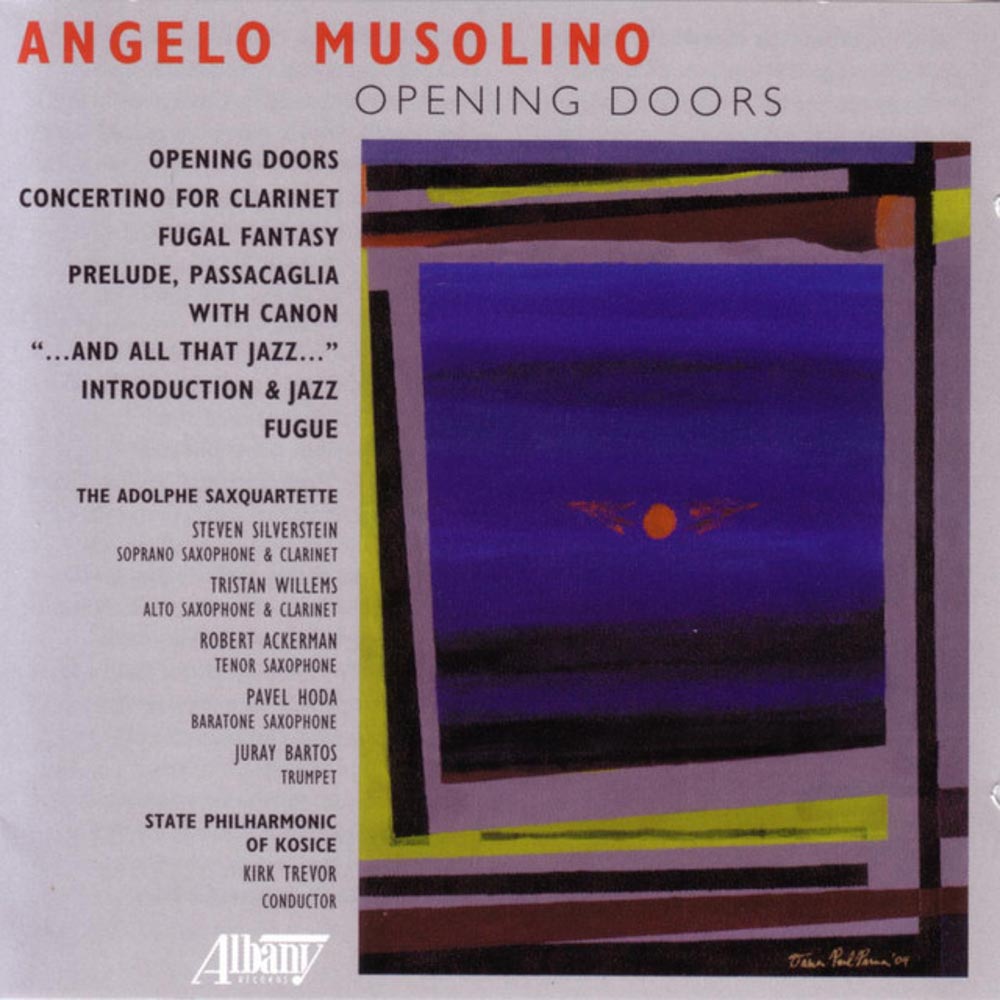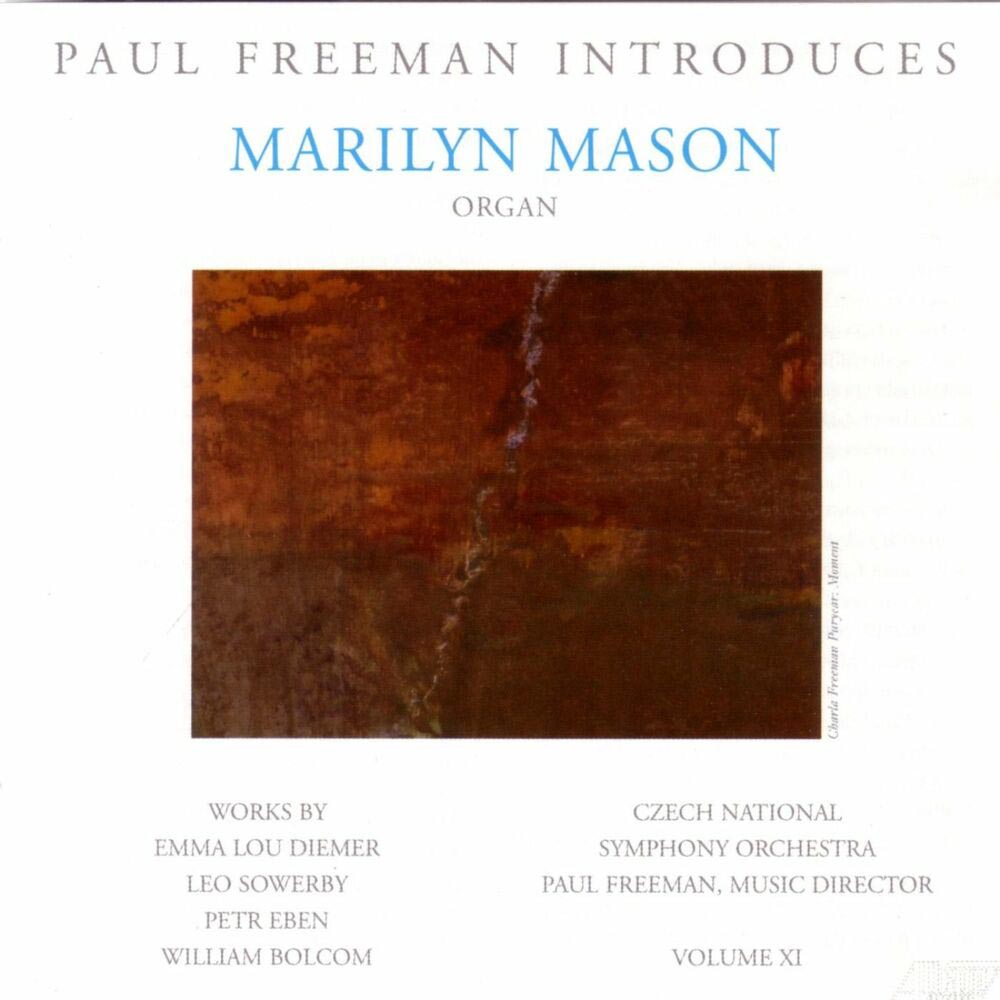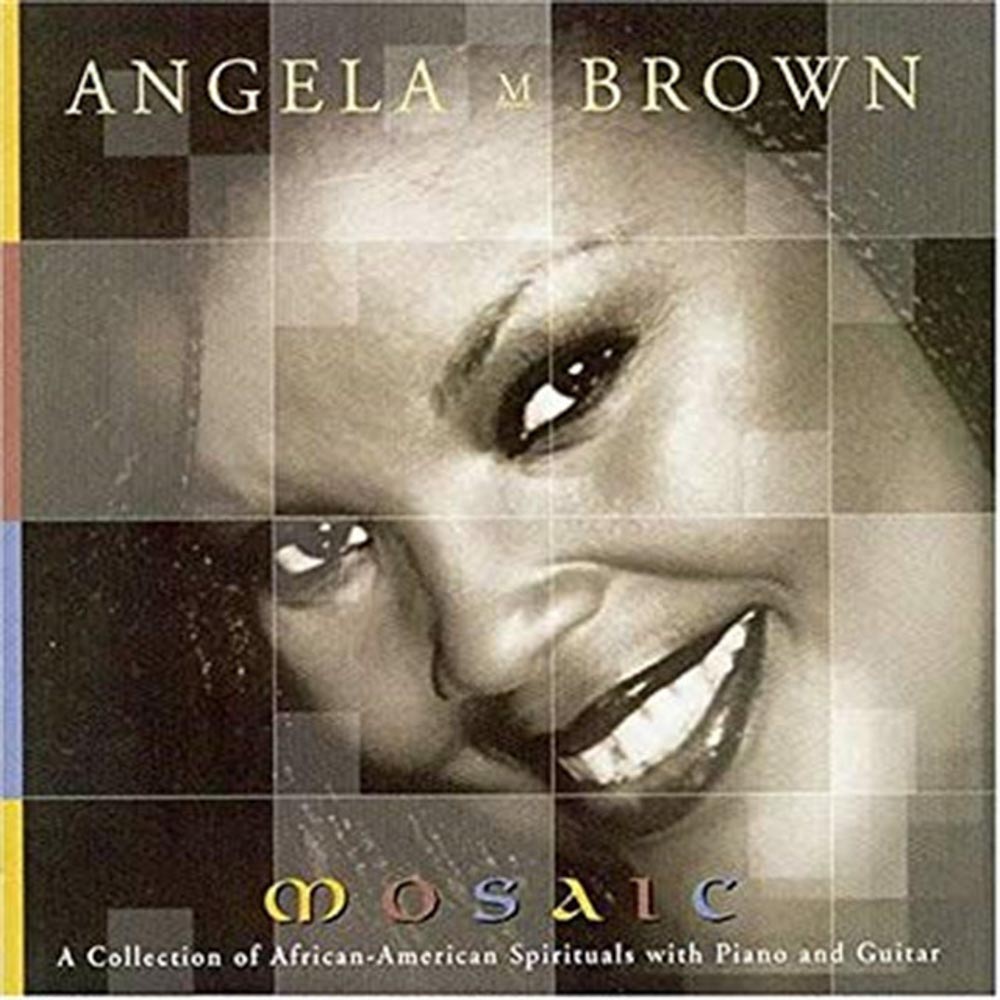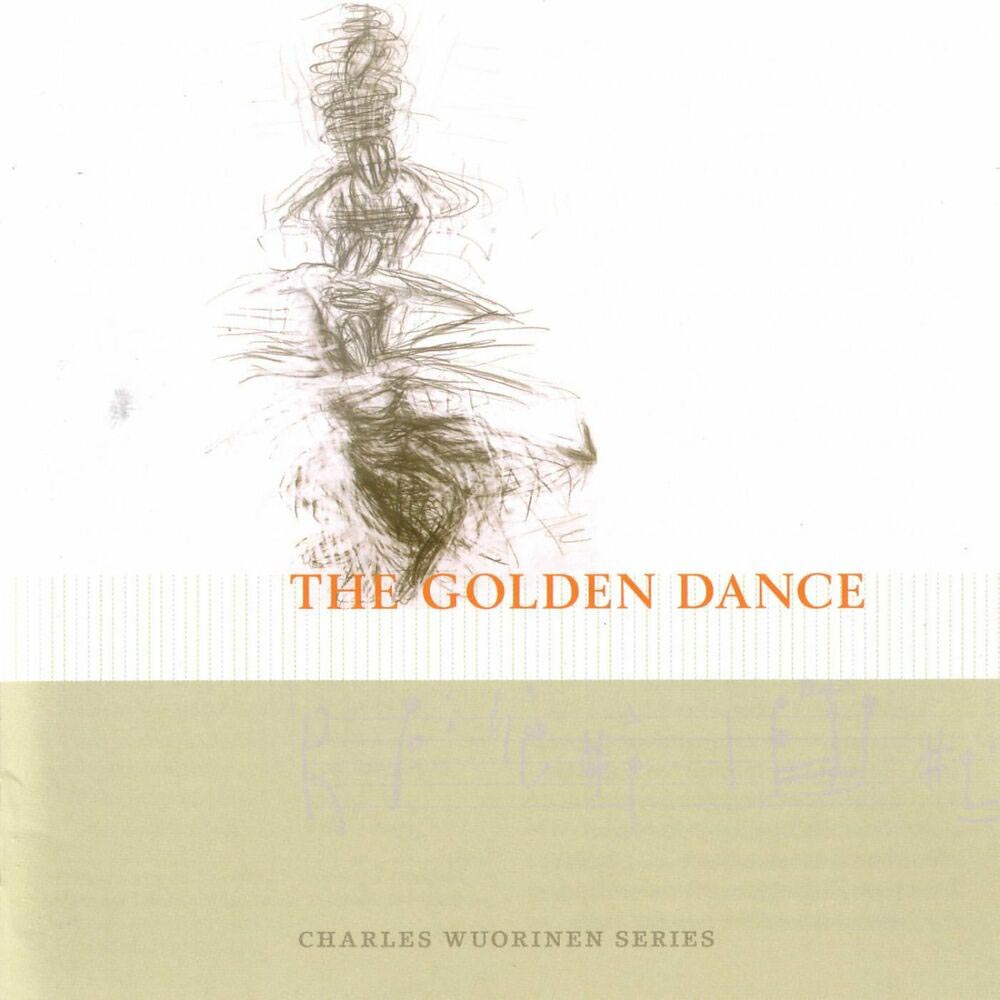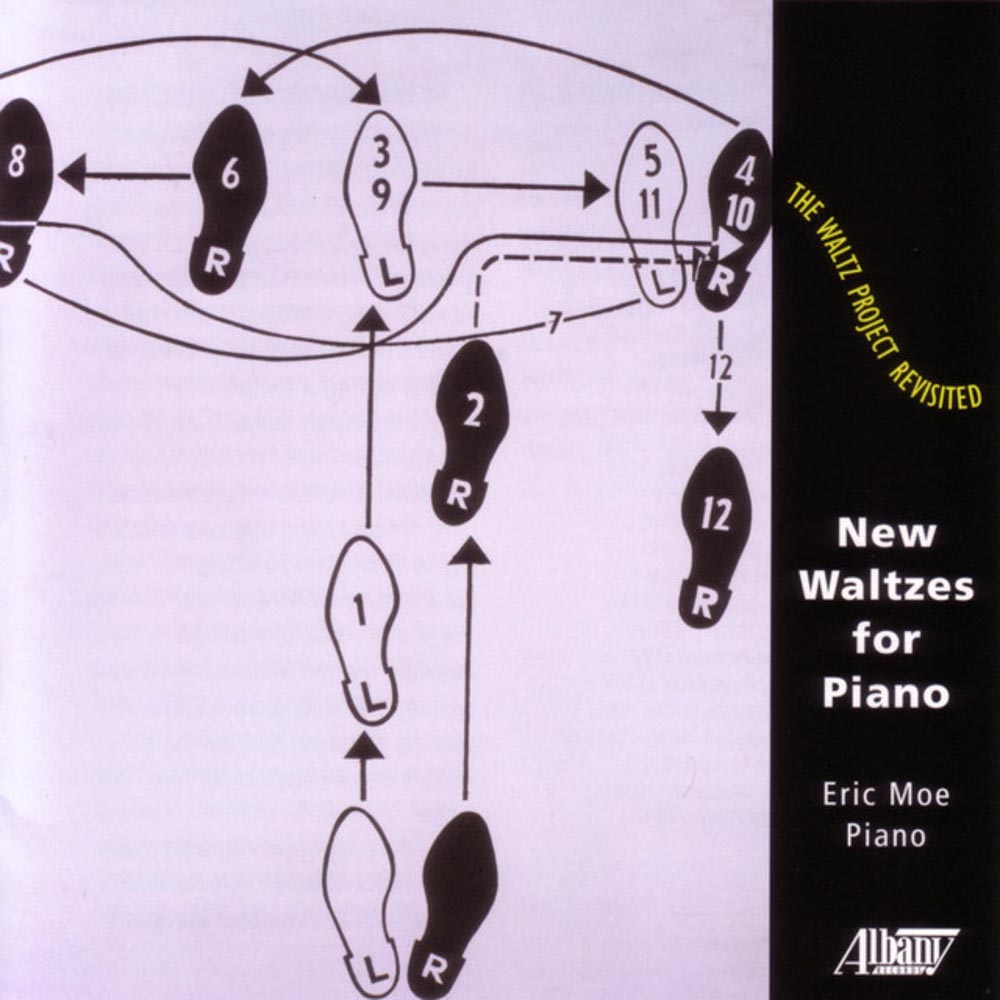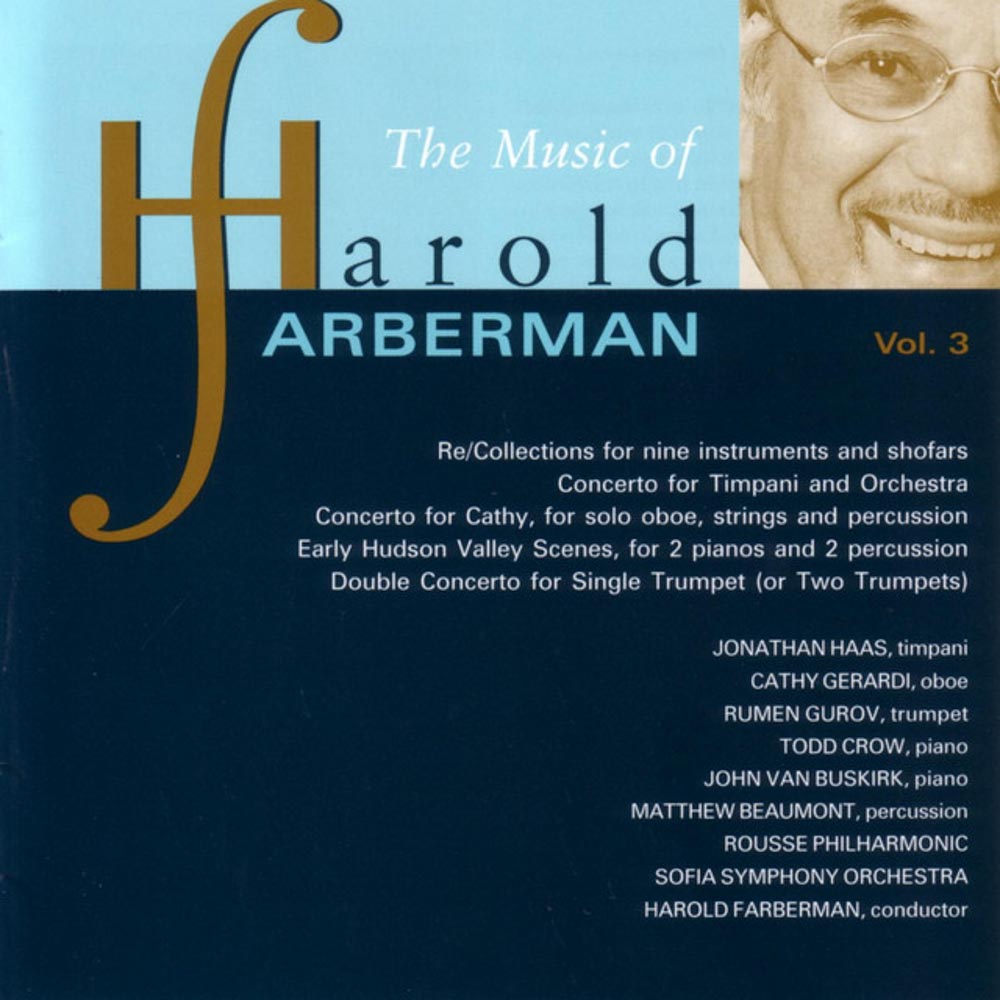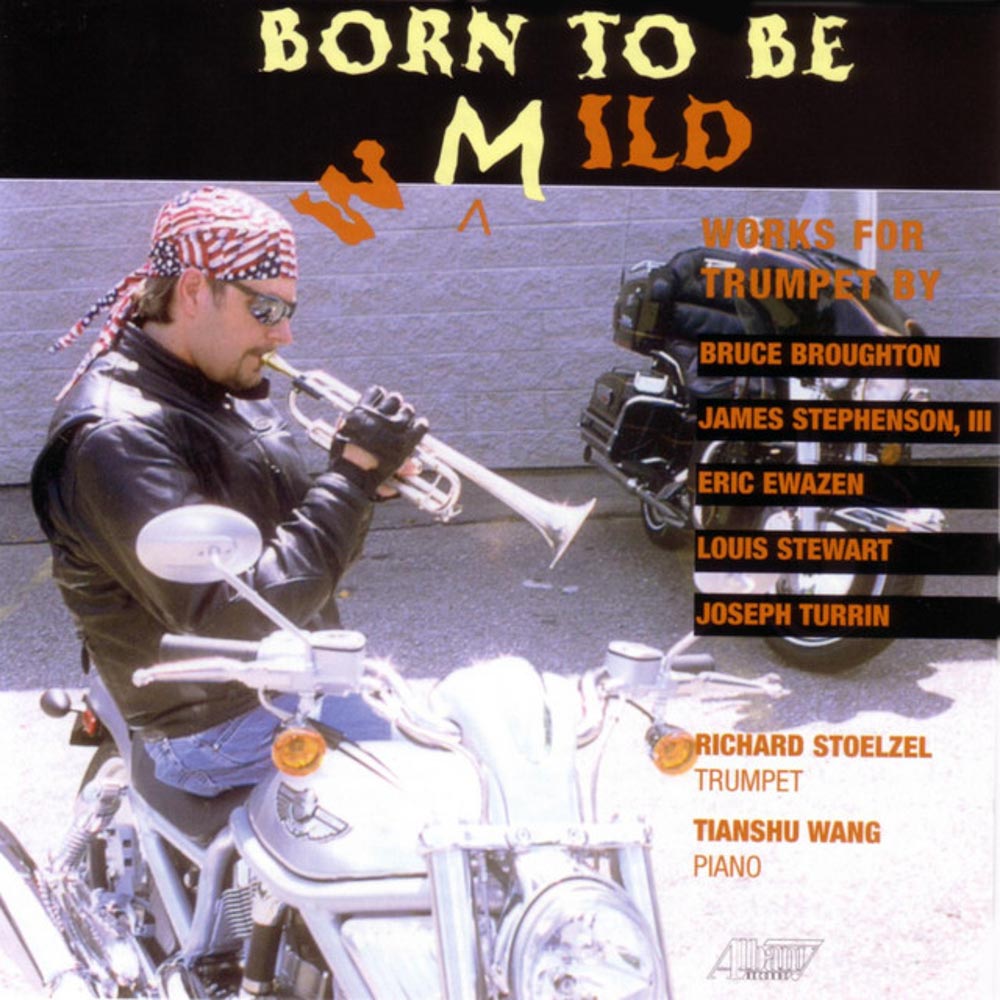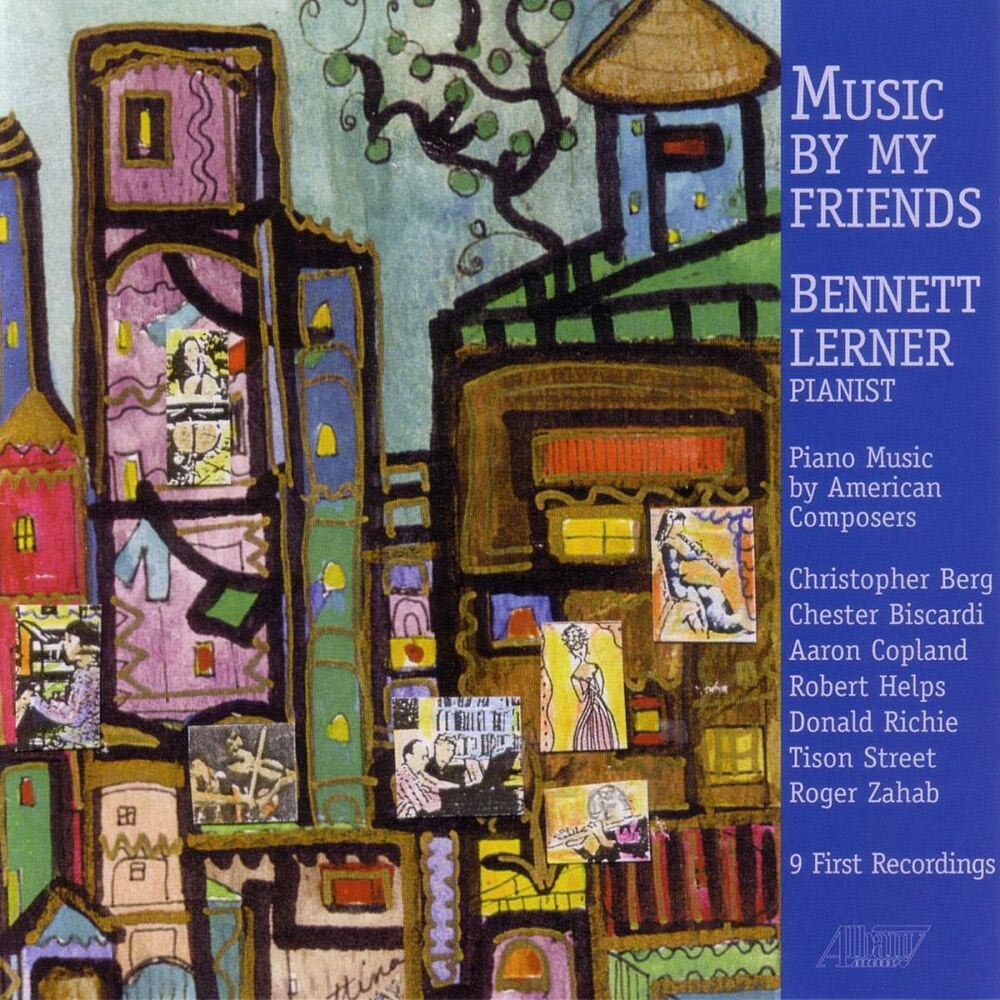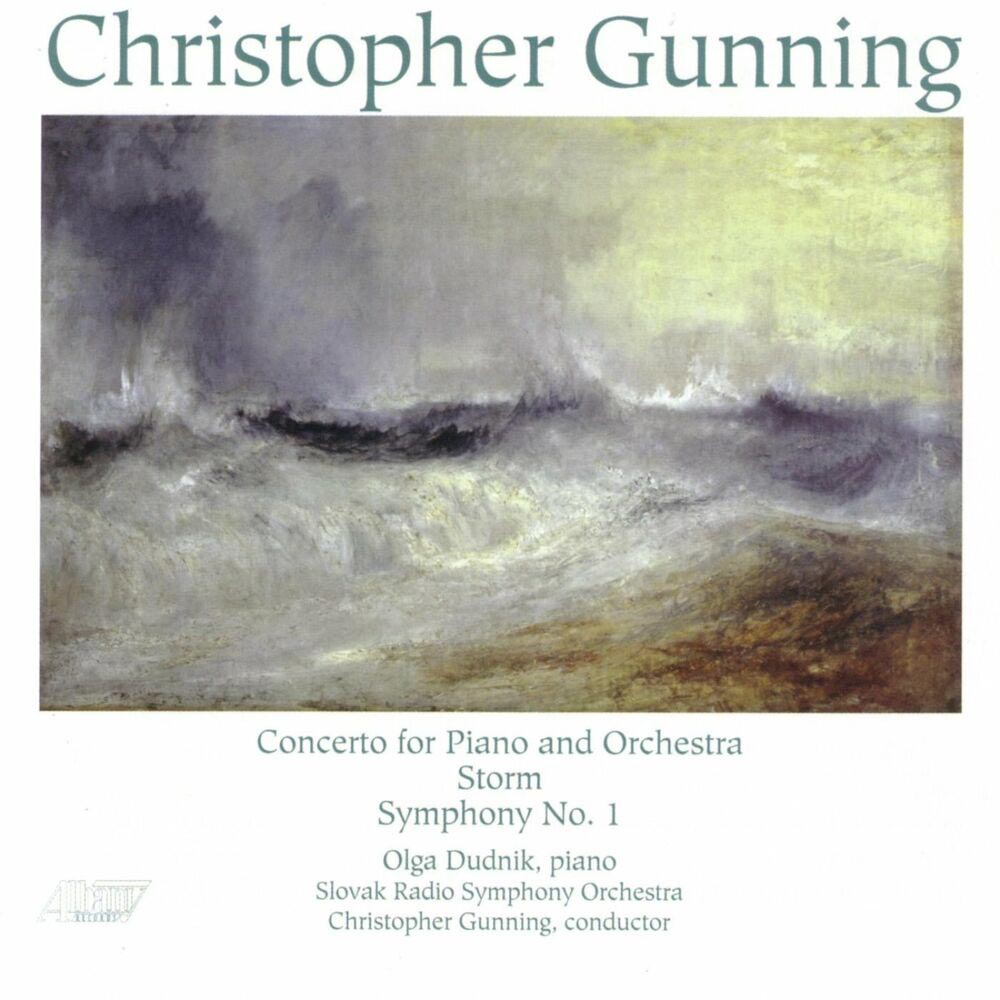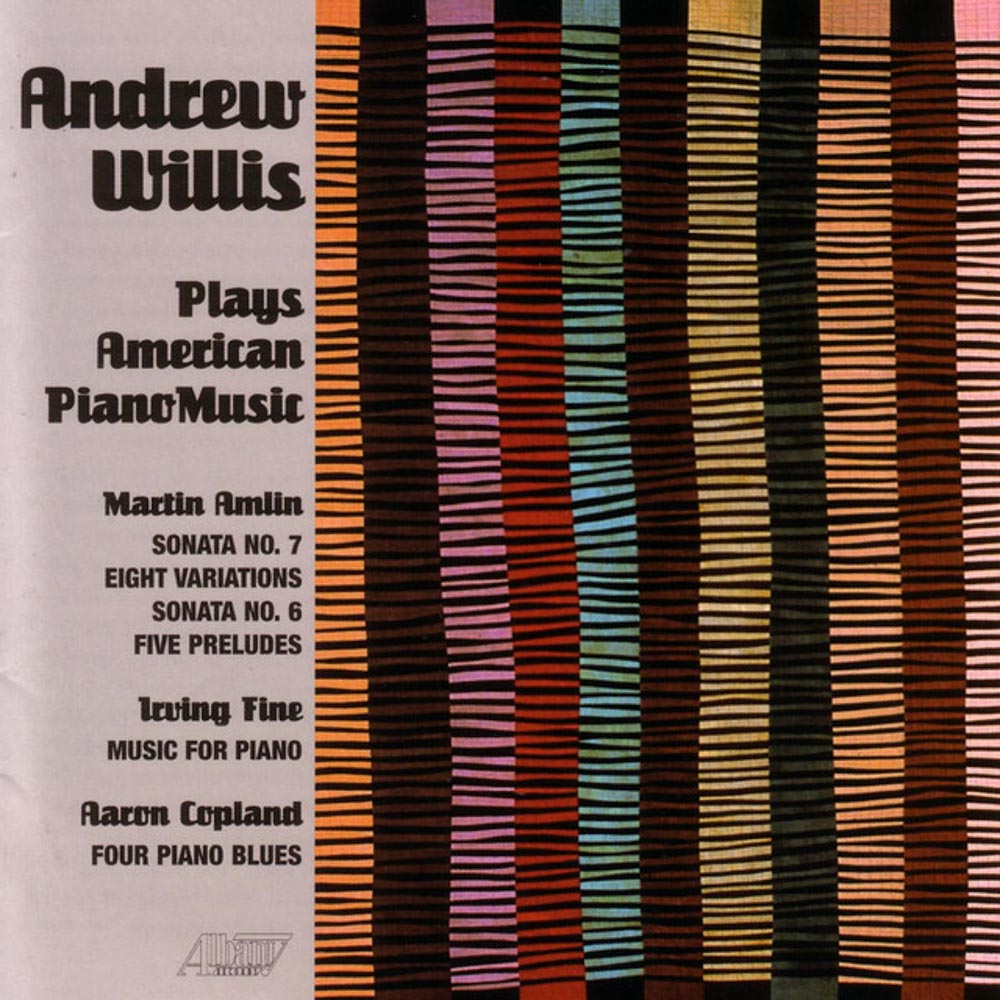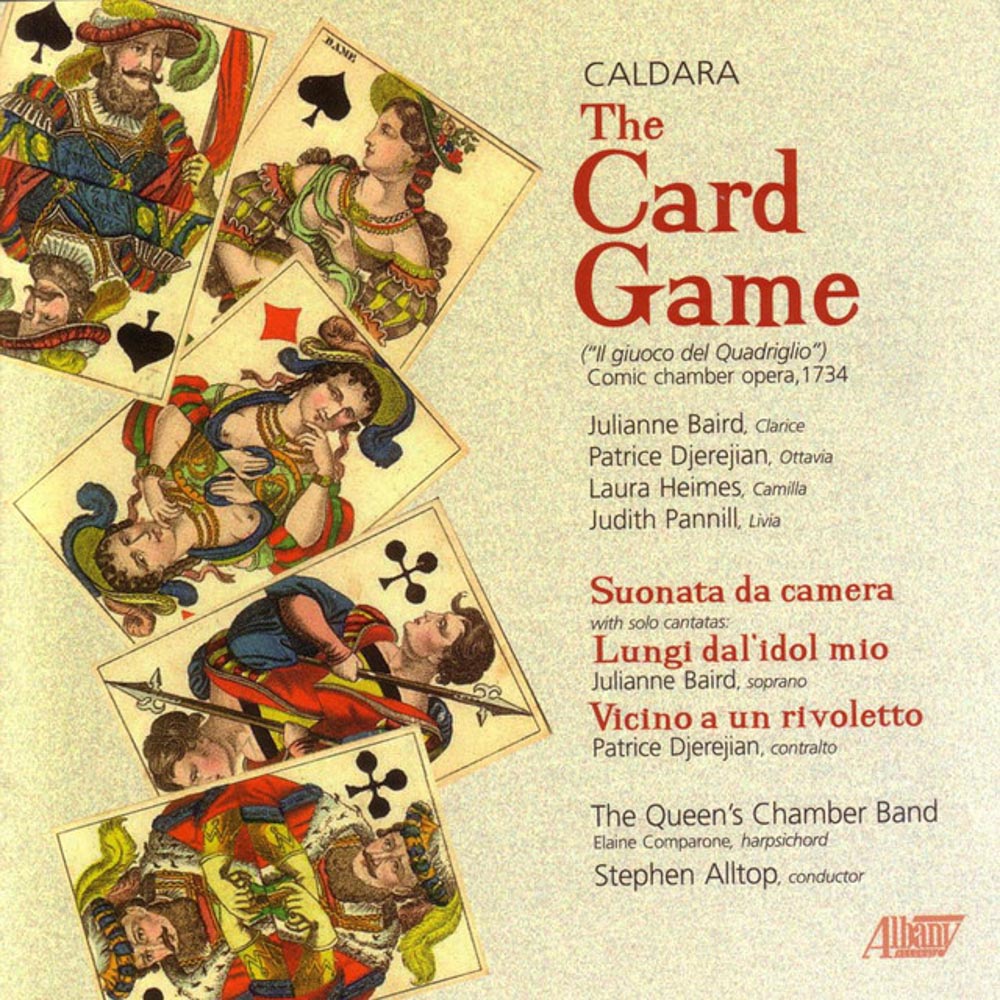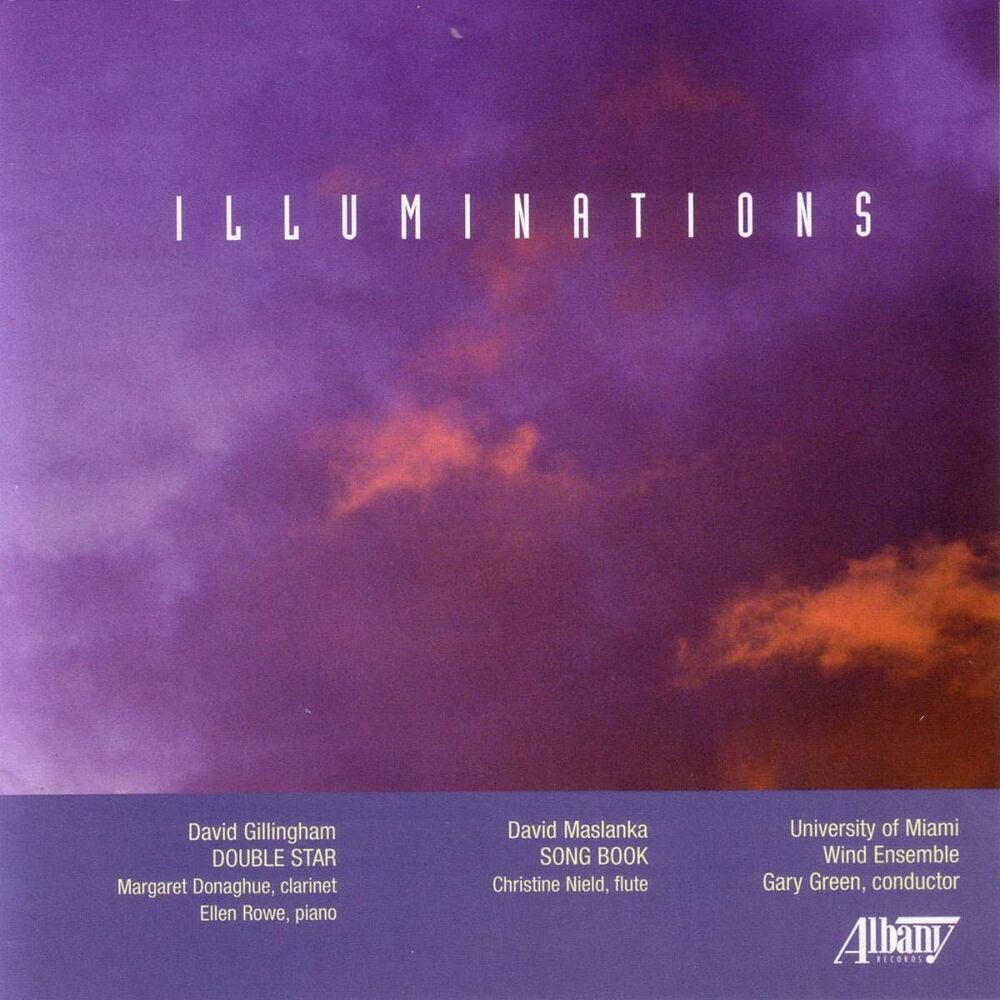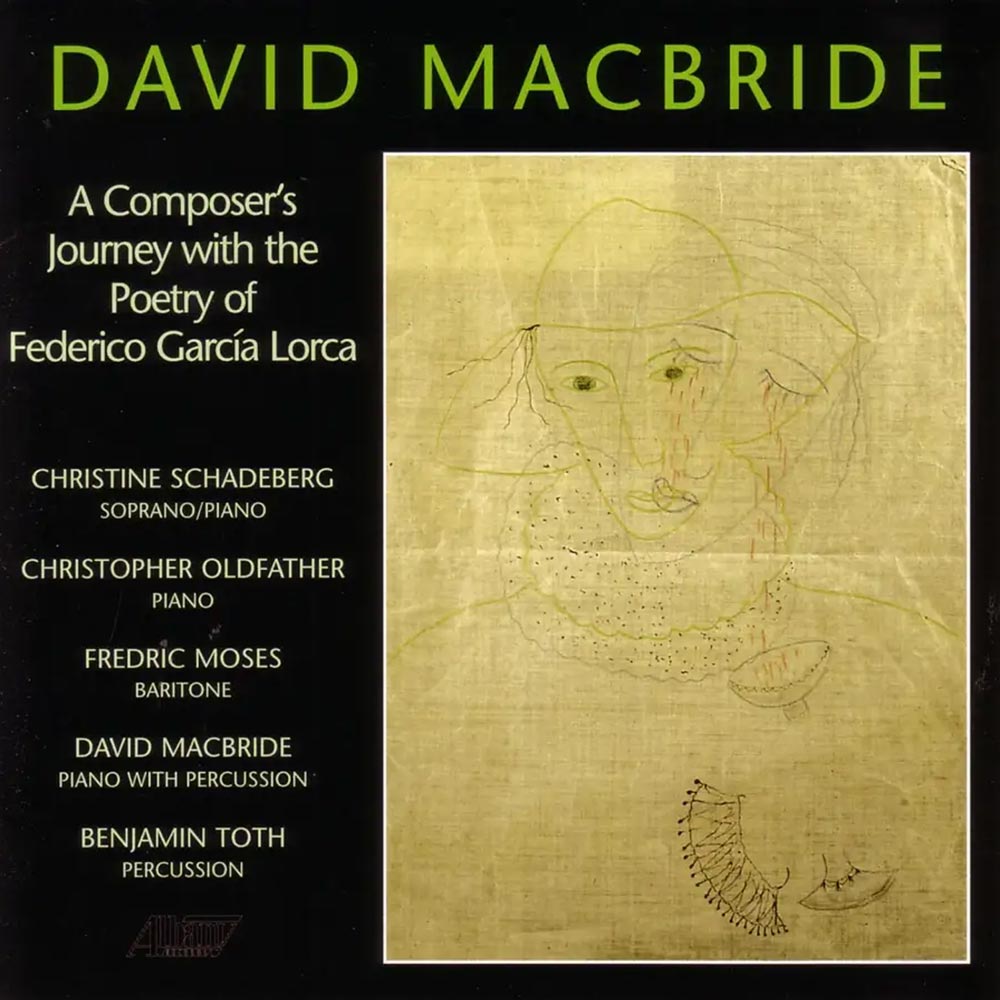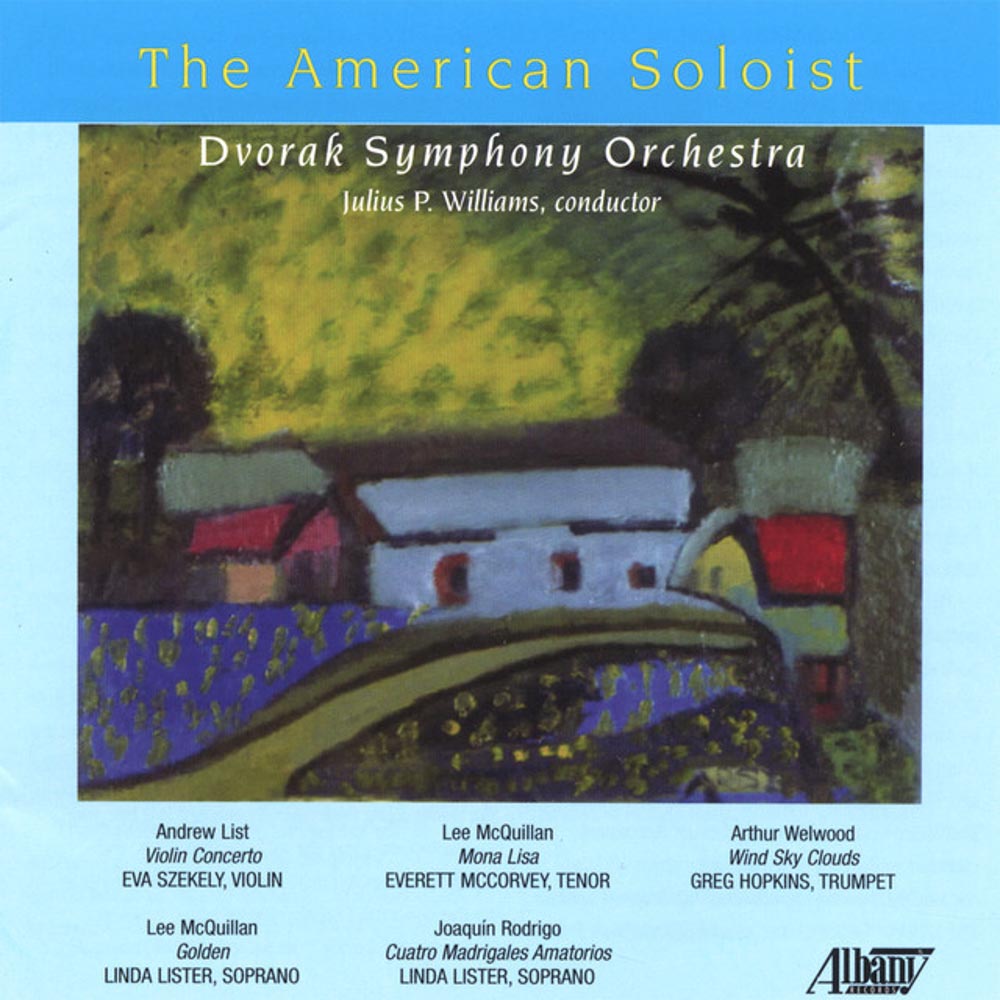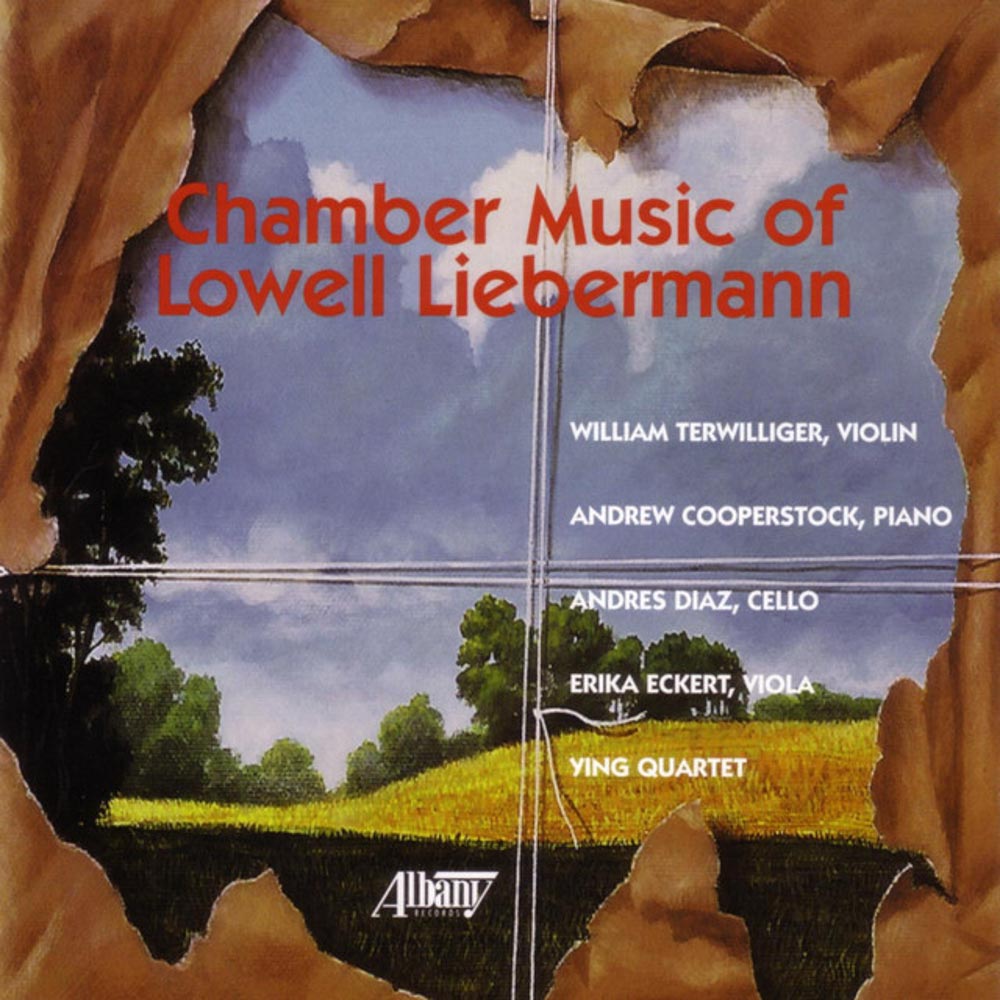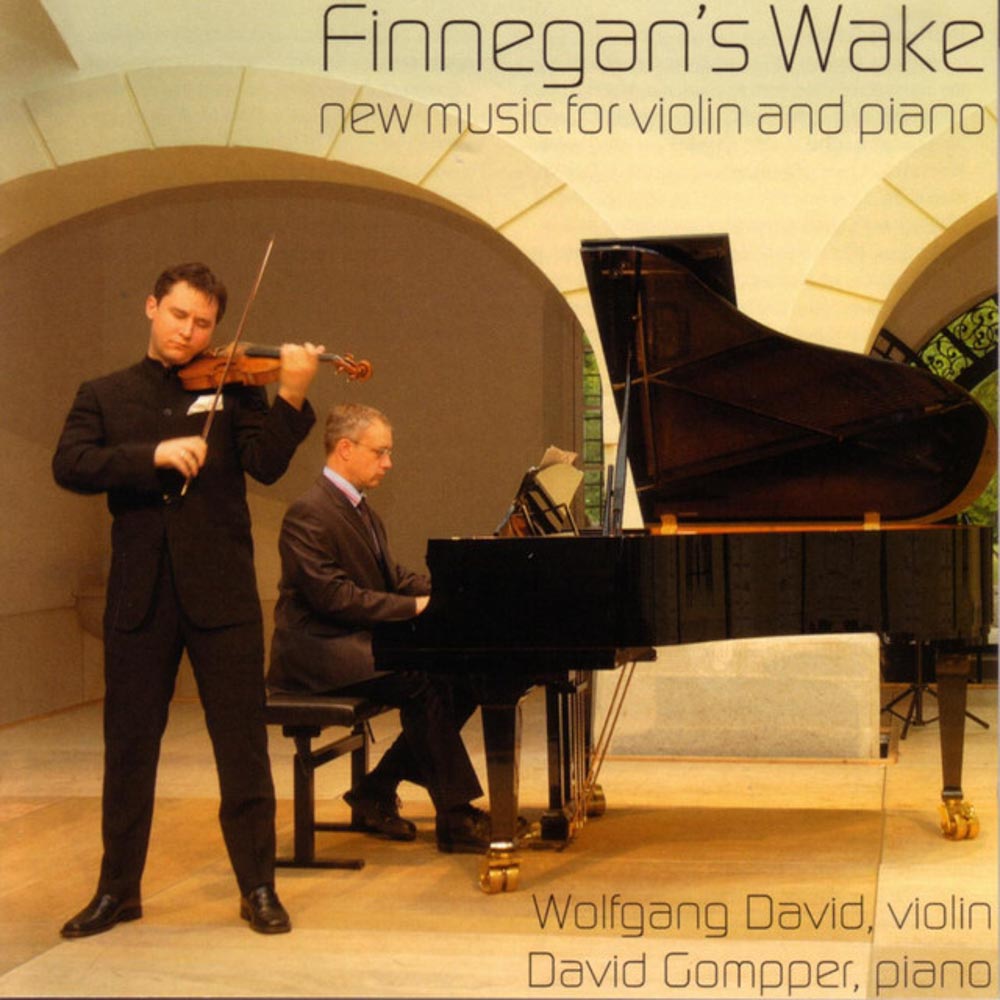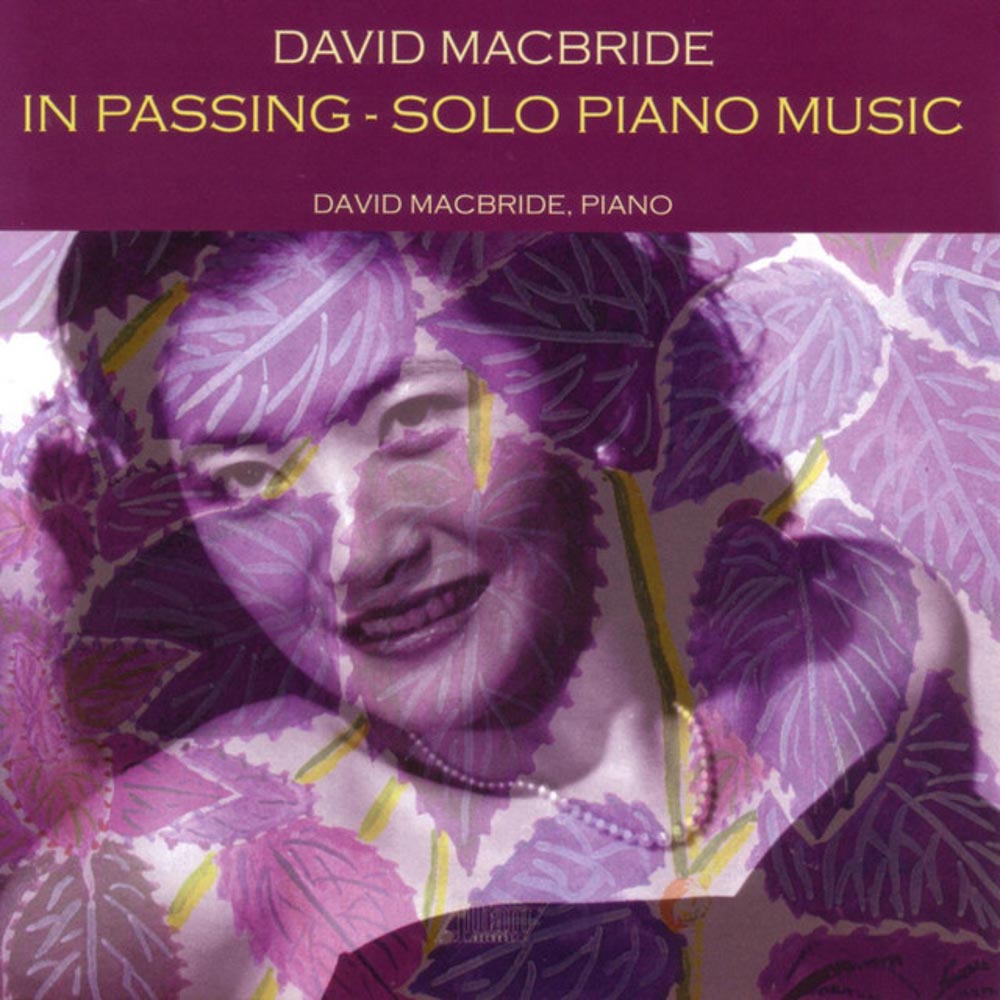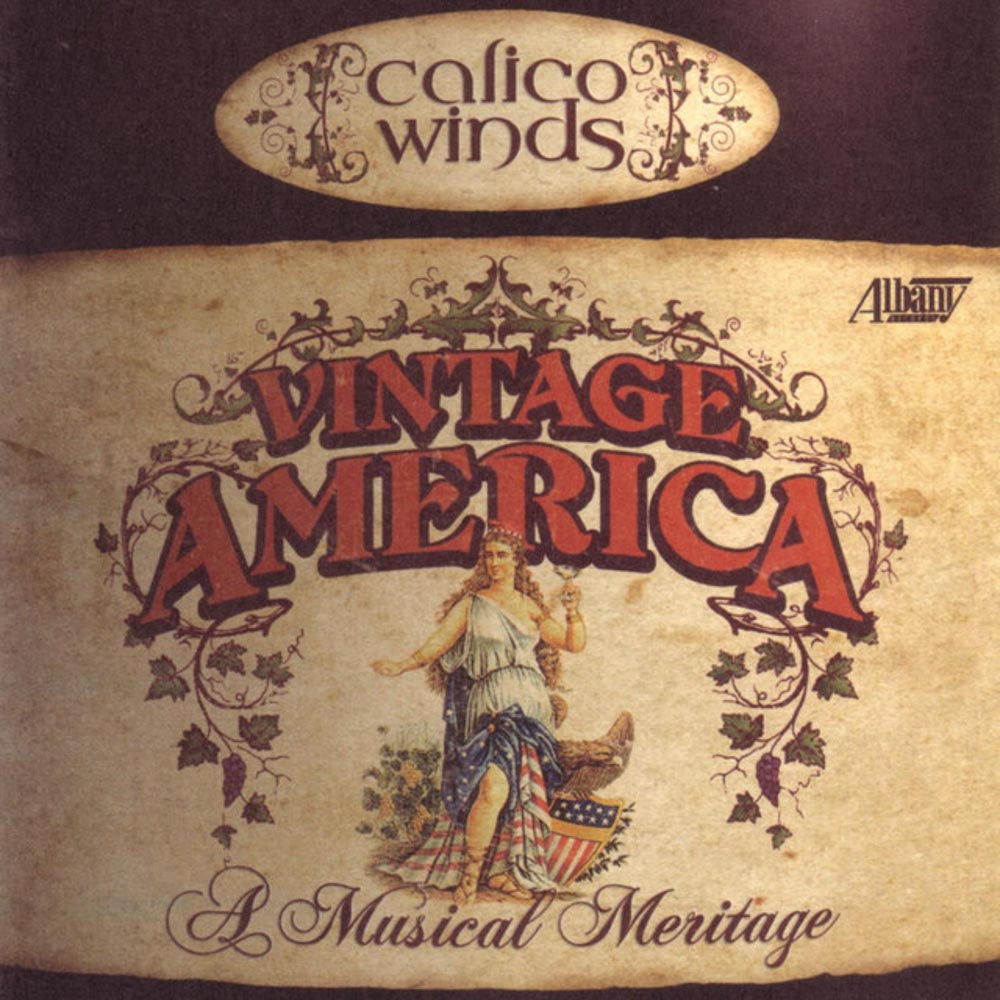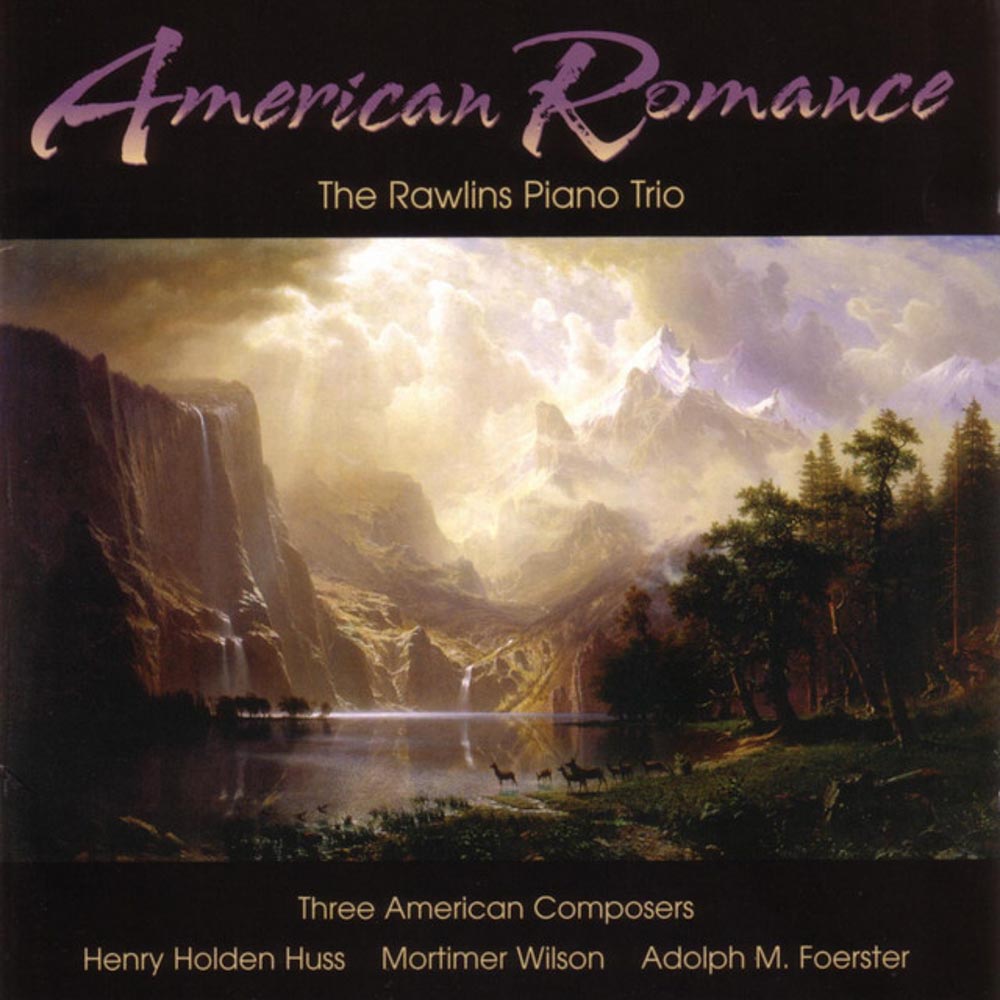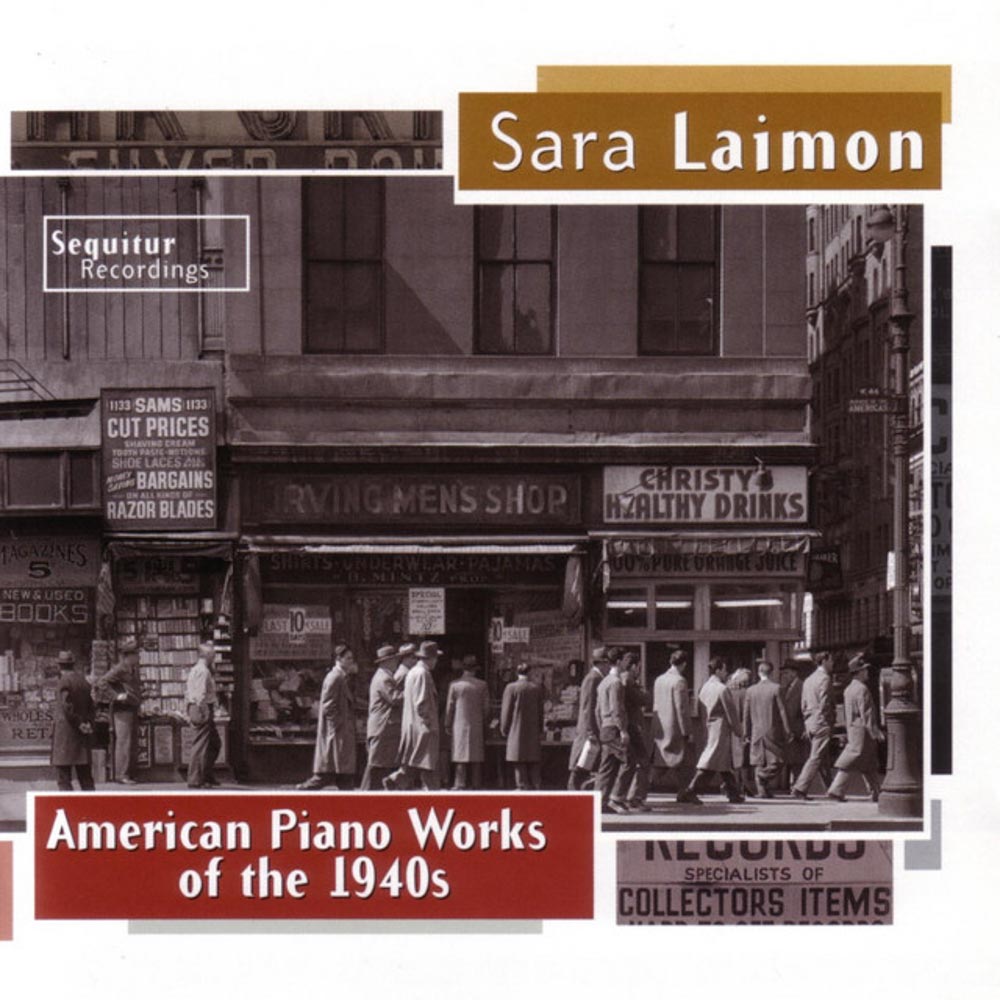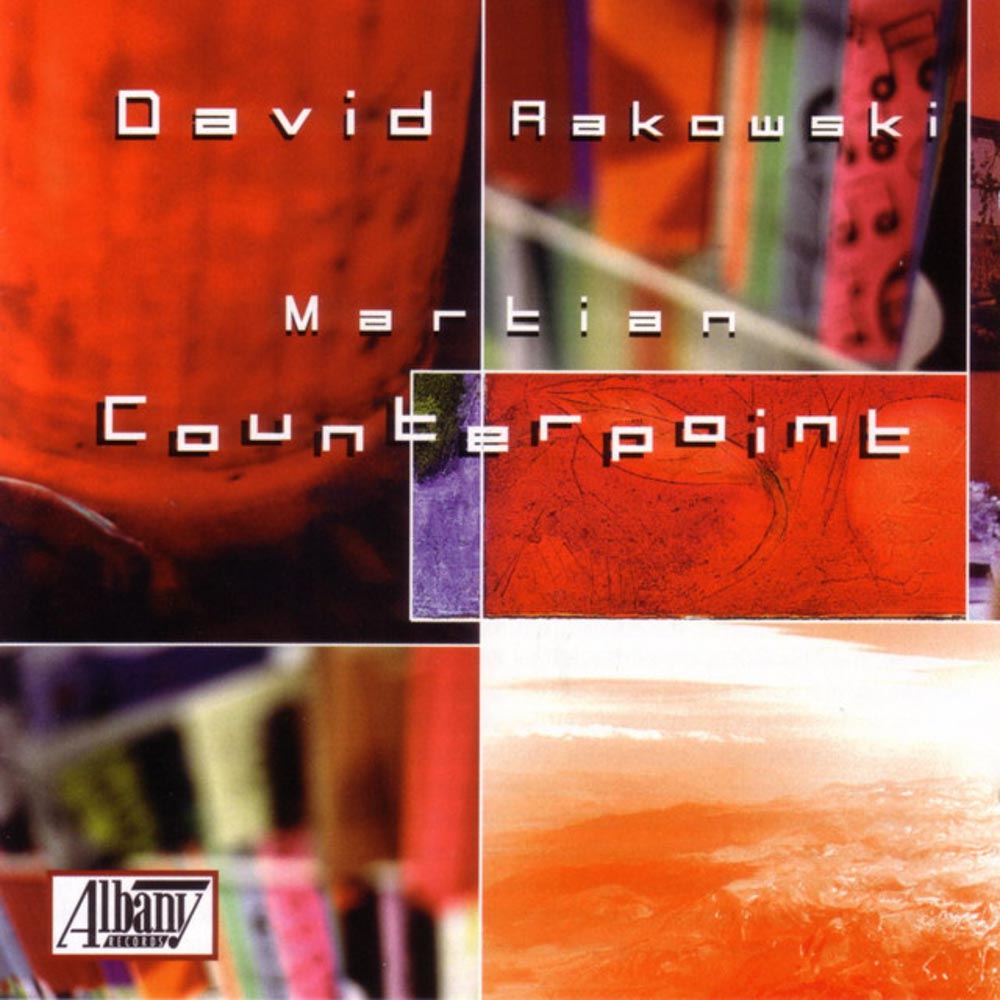Catalog #: TROY0714
Release Date: December 1, 2004ChamberComposer and conductor Anthony Iannaccone studied at the Manhattan School of Music and the Eastman School. His principal teachers were Vittorio Giannini, Aaron Copland and David Diamond. During the early part of his career, he supported himself as a part-time teacher at the Manhattan School of Music and as an orchestral violinist. His catalog of approximately 50 published works includes three symphonies, smaller works for orchestra, numerous chamber pieces, several large works for chorus and orchestra, large works for wind ensemble and several extended a cappella choral compositions. He enjoys an active conducting career in both new music and standard orchestral repertory. Since 1971, Iannaccone has taught at Eastern Michigan University, where he received the Distinguished Faculty Award and, for thirty years, conducted the Collegium Musicum in late 18th century music for chorus and chamber orchestra.
Catalog #: TROY0709
Release Date: December 1, 2004InstrumentalBeth Anderson is a composer of new romantic music, text-sound works, and musical theater. Born in Kentucky, she studied primarily in California with John Cage, Terry Riley, Robert Ashley, and Larry Austin at Mills College and the University of California at Davis. She lives in Brooklyn and produces Women's Work, a concert series that enjoyed its premiere season in February 2004. Kyle Gann writes: There's an aspect of late 20th-, early 21st-century music that I half-kiddingly refer to as 'the simulation of normalcy.' Let me explain. The guiding principle of modernist music had been Ezra Pound's 'make it new.' Mid-century composers tried to make music that sounded crazy, strange, like nothing you'd ever heard before. The one-upmanship involved in that quest eventually got out of hand - or, at least, it left audiences behind, who gave up looking for recognizable features or points of entry into increasingly abstract and complex sound-structures. And so the generation that came of age in the 1970s inherited a logical double-bind worthy of a Zen koan. On one hand they had the same need to express originality and personality as their forebears. On the other, they needed to write music attractive enough, communicative enough, to kickstart a new new-music audience again pretty much from scratch, the traditional classical audience having more or less abandoned interest in anything outside the standard repertoire. What the best of these composers came up with is often a music that wears its originality on the inside: a music whose tonalities and textural consistency are not all that foreign from popular or classical music you're already used to, but whose underlying quirks make it a more challenging experience than you first think. All this is especially true of the aspect of Beth Anderson's music found on this disc. We have an extended piano solo; some songs; some piece for violin and piano. Nothing strange about any of that (though I'll admit, the concluding Cleveland Swale may be the only piece ever written for piano and two double basses). The music is mostly tonal. It is generally pretty, even lyrical. It even uses humorous poems and nursery rhymes. The pieces conform to genre, more or less. Your first impression may be that it's pretty simple stuff, possibly even nanve. But on close listening, such impressions turn out to be misleading...This is not 'normal' music. But on a certain level it sure stimulates normalcy."
Catalog #: TROY0708
Release Date: December 1, 2004OrchestralAngelo Musolino has been an educator for more than 40 years, both as private instructor and as a college professor at the Brooklyn Conservatory of Music, Empire State College and Adelphi University where he directs the Pop Ensemble for which he still writes music.
Catalog #: TROY0706
Release Date: December 1, 2004OrchestralEmma Lou Diemer is a native of Kansas City, Missouri. She received her composition degrees from Yale and Eastman and also studied in Belgium and at Tanglewood. She is professor emeritus at the University of California, Santa Barbara, where she taught from 1971-1991. The Concerto in One Movement for Organ and Chamber Orchestra ("Alaska") was written in May, 1995 for Madeline Schatz and the Arctic Chamber Orchestra, and premiered January, 1996 at the University of Alaska, Fairbanks. The soloist was the composer. Marilyn Mason has had a long association with Leo Sowerby's Classic Concerto for Organ and Strings for she gave the work its European premiere in 1957, and in preparation for this she worked closely with the composer himself. Petr Eben is one of the leading composers of the Czech Republic. He studied at the Prague Academy of Music. In 1955, he took up a teaching post in the History of Music Department at Prague's Charles University. In 1978-79, he was professor of composition at the Royal Northern College of Music Manchester. From 1990, he became professor of composition at the Academy of Performing Arts in Prague and President of the Prague Spring Festival. Of the Organ Concerto No. 2, he writes: "After the first organ concerto, which is more of an extended symphony with a concertante organ part, I wanted this time to write a true concerto for organ and orchestra. One of the problems of an organ concerto is that the organ, unlike all the other solo instruments, has a potential in sound equivalent, or nearly so, to that of the orchestra; in exposing both partners at their full volume, there is a risk of overloading the texture. Therefore, in many cases I have placed both elements on different planes, contrasting them not only in their thematic material, but also in time signature and tempi. Elsewhere, I have divided melody and accompaniment between both partners, so that either the organ or even the orchestra takes the role of a melodic instrument, and the orchestra is often written as a unison voice." William Bolcom dedicated Gospel Preludes, Book IV to Marilyn Mason, who premiered the three hymn-fantasies at the University of Michigan in 1986. The composer writes: This is the last collection of my Gospel Preludes, bringing the total to twelve. Sometimes I Feel Like a Motherless Child was a reaction to the brutal end of Marvin Gaye, whose Motown career went beyond the more or less usual stereotype and whose personal life led to his murder. Sweet Hour of Prayer always has had a febrile intensity for me, and I set it with that mood in mind. The final is a combined fantasy on O Zion Haste and a gospel-influenced 5/4 setting of How Firm a Foundation, which caps the whole series." Bolcom's score stands amidst an impressive pile of 20th century compositions brought to life by the energy and determination of Dr. Mason.
Catalog #: TROY0721
Release Date: November 1, 2004VocalOn October 29, 2004, Angela Brown made her Metropolitan Opera debut as Aida in the great Verdi opera. Hailed in Opera News as "one of America's most promising Verdi sopranos," she was a National Metropolitan Opera Council Audition winner in 1997. The 2003 - 2004 season marked a new high for Miss Brown's career as it encompassed four highly successful role debuts, a Carnegie Hall debut, two glowing reviews each from The New York Times and Opera Now and word to the wise to keep a watch on her career from Opera News. It all began in Spring 2003, as she stepped in for one performance of Ariadne in Philadelphia and received this review from Opera Now: "In one of those dramatic twists that are the stuff of opera, the soprano covering the title role in Ariadne auf Naxos at the Metropolitan Opera got her chance to sing it - at the Opera Company of Philadelphia. The young American soprano Angela Brown took over one performance...She (Ms. Brown) has a powerhouse of an instrument, shimmering with color and imaginatively used, and she knows how to take center-stage." Then, in the fall of 2004, Angela sang an unexpected performance and her debut as Leonora in Opera Company of Philadelphia's Il Travatore. In January, 2004, she made her debut as Elisabetta in Don Carlo with Opera Company of Philadelphia receiving this praise from The New York Times: "Angela Brown, a soprano, brought dignity and shimmering pianos, and hit a bull's-eye with her final aria." Opera News wrote: "Angela Brown revealed herself as a soprano to watch. Brown displayed good command of Verdi's style, imaginative phrasing and a warm, expressive voice." Opera Now said: "Angela Brown's beautiful lyric soprano voice was ideal for Elisabetta. She floated pianissimos that seemed to hang in space, shimmering, and she had plenty of power for her last big scene." It is an especial privilege for Albany Records to present a magnificent soprano on the brink of a major career.
Catalog #: TROY0712-13
Release Date: November 1, 2004OperaJames Stuart, the person in charge of preparing the new performance edition of Robin Hood writes: "The Ohio Light Opera production of Robin Hood brings my world of operetta full circle. As a lad a few years into his teens, I attended a performance of this work given by Louisiana State University. I had caught the opera bug a few years earlier when the boys' choir in which I sang was chosen to appear as acolytes in the Te Deum scene of LSU's Tosca. At that time, I didn't distinguish a difference between opera and operetta Ð to me they both meant orchestra, singers, sets and costumes. I soon learned that although the ingredients were the same, there are distinctions. There are patronizing persons who equate lightness of style and subject with lightness of quality. This, of course, is not accurate. The finest operettas may be of vastly superior musical quality to grand operas produced by more minor composers. To my mind, this is the case with Reginald De Koven's Robin Hood, generally referred to as the first great American light opera. But is it American? Although De Koven was born and died in this country, most of his formative years were lived in England and Europe. Born in Middletown, Connecticut on April 3, 1859, he moved to England with his family at the age of 11. He studied with among others, Franz von Suppe in Vienna and Leo Delibes in Paris. De Koven felt that light opera needed "to be as well sung in its way as grand opera," and composed for his singers in that manner. When Robin Hood was first presented critics generally wrote of "reminiscences of Sullivan and Offenbach." Like Sullivan, he wanted to write a grand opera. It is said that Sir Arthur Sullivan remarked with disenchantment while attending a performance of his own opera Ivanhoe. "...a cobbler should stick to his last." And so with De Koven. Richard Aldrich, theatrical producer and husband of Gertrude Lawrence wrote in The New York Times (March 11, 1917): "Such popularity as Robin Hood has had is not given to many comic operas to win and to keep so long."
Catalog #: TROY0711
Release Date: November 1, 2004OrchestralTim Page has described Five as "...another in a distinguished series of compositions Wuorinen has written for the cellist Fred Sherry. Dating from 1987, it is the most recent piece on this disc and (to employ, reluctantly, what has become an increasingly noxious code word) probably the most "accessible."" Five was commissioned by the New York City Ballet for their 1988 American Music Festival. Fred Sherry writes: "Five is a cellist's showpiece, a dance, a thrill for the audience, and a beautiful example of Wuorinen's versatility and technique." Michael Steinberg writes: "The Golden Dance was commissioned with the cooperation of the San Francisco Symphony by the Meet the Composer Orchestra Residencies program. It was written for Herbert Blomstedt and the San Francisco Symphony on the occasion of the Orchestra's 75th anniversary. It was completed in May, 1986 and was introduced on September 10, of that year. Wuorinen, who likes to make his titles topical and, if possible, punning, has called this piece for San Francisco The Golden Dance. No need to elaborate on the associations called up by the word 'golden' in California. The other meaning is not obvious, and that is the role played in the design by the golden section, that classical division of a line, thought by the Greeks to yield an aesthetically perfect proportional relationship, where the smaller section is to the larger as the larger is to the whole." The Concerto for Amplified Violin and Orchestra was commissioned by the Fromm Music Foundation for Paul Zukofsky, Michael Tilson Thomas and the Boston Symphony Orchestra. It was composed between June 25, 1971 and April 2, 1972 and premiered at Tanglewood on August 4, 1972. The Concerto is in three movements and is marked by a unique relationship between soloist and orchestra; they are on an equal acoustic footing. The amplification of the soloist enables him to compete with the entire orchestra at full volume. The impact is visceral and immediate.
Catalog #: TROY0698
Release Date: November 1, 2004ChamberJeffrey Mumford was born in Washington, D.C. and has been conspicuously active in that city's musical life. His music has been performed throughout the United States and abroad and the present CD was preceded by one on the CRI label, similarly devoted to his chamber music. Honors, awards, fellowships and commissions have come to him from many prestigious sources. Following a year as composer-in-residence at Bowling Green State University's College of Musical Arts, Mumford joined the faculty of the Oberlin College Conservatory of Music in the fall of 2000. Two of Mumford's orchestral works - the celebratory fanfare Within a cloudburst of echoing brightness (1995) and Amid the light of quickening memory (2003) were commissioned and introduced by the National Symphony Orchestra under Leonard Slatkin. These titles are characteristic for Mumford. He has shunned traditional sonatas and symphonies in favor of music that tends to define its own shape and substance, and his titles allude to the impressions or moods behind the creative impulse. References to light, radiance and resonance are as abundant in his titles as references to angels in the works of Einojuhani Rautavaara and Augusta Read Thomas. Mumford has stated that his music in general is "inspired by cloud imagery, light and the unique aspects of the energy that characterize the various times of day." While his works are generated from such impressions, they are not tone poems in the conventional sense of "painting pictures" or delineating action, and listeners would be well advised to avoid seeking or expecting specific images in them.
Catalog #: TROY0689
Release Date: November 1, 2004InstrumentalEric Moe writes: "The waltz traffics in weightlessness. By adding an extra step to the one-two/left-right of pedestrian movement, it forces the waltzer and listener off the ground and into the air (left-right-UP). Some of these waltzes tackle gravity head on (Roger Zahab's Levitation of pianos during a waltz), others are more insinuatingly buoyant, but all share this attribute. These new waltzes are not exclusively American - there are contributions from Poland (Zygmunt Krauze's Music Box Waltz) and Nigeria (Akin Euba's Study in African Jazz 3) - but they are indebted to vernacular American rhythms which add even more bounce. Their distinguished European ancestry is recognizable, but these waltzes are very much of our time - only lighter. I have revisited Robert Helps' and Robert Moran's Waltz Project of the mid-1970s - half of the 22 waltzes on this CD are from the collection published by C.F. Peters. They include works that have become standards of the repertoire, such as Milton Babbitt's Minute Waltz and Philip Glass' Modern Love Waltz, as well as other gems. The remaining 11 waltzes are new, ten composed especially for this recording, with Ricky Ian Gordon's Waltz a happy discovery. The variety is enormous. Some have a direct connection with jazz: Anthony Cornicello's PostModern Waltz deconstructs a famous McCoy Tyner solo; my own Pulaski Skyway Waltz begins with a quotation from Mal Waldron's Firewaltz, Akin Euba's "African Jazz" study draws from the musical wells of Africa and Vienna, while Andrew Imbrie infuses a one-to-the-bar waltz with the headlong energy of bebop. Lee Hyla's One Moe Time has an improvisational feel, eventually cutting loose ecstatically before returning to its senses. Other waltzes comment trenchantly on the genre itself, like Ron Caltabiano's Character Sketch: About a Waltz. Virgil Thomson's birthday card to Mrs. Efram Zimbalist subverts the waltz rhythm with a thumping duple cross-rhythm in the process of quoting "Happy Birthday." Charles Wuorinen's Self-Similar Waltz operates on a deeper level of wit, reflecting its muscular self in myriad ways; the listening experience is like walking through a set of fun-house mirrors."
Catalog #: TROY0688
Release Date: November 1, 2004ChamberHarold Farberman's career as a conductor has overshadowed his achievements as a composer. In fact, while a member of the Boston Symphony Orchestra, Farberman turned first to composition as a further creative outlet, which in turn led to his more visible conducting career. From the mid-fifties onward, when he composed his first work, Evolution, for soprano, French horn and seven percussionists, Farberman has never stopped creating music. Harold Farberman was born on November 2, 1929 on New York City's Lower East Side. Coming from a family of musicians (his father was the drummer in a famous 1920s Klezmer band led by Schleomke Beckerman; his brother was also a drummer) it seemed inevitable that he pursue music as a career. After graduating from the Juilliard School of Music on a full scholarship in 1951, he immediately joined the Boston Symphony Orchestra percussion section and became the youngest member of the orchestra at that time. Incidentally, Farberman has the distinction of being the only Juilliard instrumental graduate who has been invited back as a conductor of its various orchestras and as a composer - he was commissioned to write an opera for the opening of The Juilliard Opera Theater (The Losers). With a performer's knowledge of percussion instruments and a dissatisfaction with their conventional treatment, Farberman became an early advocate for the use of percussion sonorities as a major voice in compositional structures. His very first work, Evolution, written in 1954, before he began formal studies in composition, is scored for over one hundred percussion instruments and has been recorded four times, once by Leopold Stokowski. After hearing Evolution, Aaron Copland invited Farberman to study with him at Tanglewood in 1955. That short involvement with Copland strengthened Farberman's resolve to acquire more compositional skills, and during his twelve year tenure with the BSO, he earned a Masters Degree in composition from the New England Conservatory.
Catalog #: TROY0665
Release Date: November 1, 2004InstrumentalBorn in New York City, Jay Reise's choreographic tone-poem The Selfish Giant, based on a fairy tale by Oscar Wilde, was commissioned by the Philharmonia Orchestra and conducted by Djong Yu in London in 1997. His opera Rasputin, described in The Washington Times as "a spellbinding, challenging and profoundly beautiful creation," was commissioned and premiered by the New York City Opera in 1988. Memory Refrains (a string quartet in one movement) was premiered by the Cassatt Quartet in 2002. Open Night was the first work commissioned by the Kimmel Center Fresh Ink Contemporary Music Series in Philadelphia in 2003. Reise studied with George Crumb, jazzman Jimmy Giuffre, Hugh Hartwell, Carnatic rhythm with Adrian L'Armand, harmony with George Rochberg, and Richard Wernick. Deeply influenced by Carnatic (South Indian) music and jazz, Reise has developed his own rhythmic method which is a signature element of his music after 1990. Jay Reise is the Robert Weiss Professor of Music Composition at the University of Pennsylvania in Philadelphia and president of contemporary music ensemble Orchestra 2001. Marc-Andre Hamelin is universally regarded as one of today's masters of the keyboard. Critics and audiences alike have enthusiastically responded to his seemingly boundless technique, which embraces both stunning virtuosity and profound sensitivity. The New York Times dubbed him a "supervirtuoso," and the London Financial Times said, "Hamelin's wizardry defies the laws of nature." Mr. Hamelin's work in the recital hall and on the orchestral stage has taken him throughout the world. His prolific recording career has resulted in nearly 45 recordings and numerous industry awards and nominations.
Catalog #: TROY0707
Release Date: October 1, 2004ChoralOne of nine choral ensembles in the University of Miami Phillip and Patricia Frost School of Music, the University Chorale was founded in 1993, by the current Director of Choral studies, Dr. Jo-Michael Scheibe. The Chorale has quickly established itself as one of Florida's leading collegiate choral ensembles. The voices are chosen from across campus, drawing both music majors and students from outside of the Frost School of Music. Jo-Michael Scheibe has degrees from California State University at Long Beach, and from the University of Southern California. He held positions in California and Arizona prior to his arrival at the University of Miami. He has served as artistic and music director of the Florida Philharmonic Chorus and is currently the artistic and musical director of the Master Chorale of South Florida. He also serves as Director of Music Ministries at the historic Coral Gables Congregational Church.
Catalog #: TROY0701-02
Release Date: October 1, 2004ChamberDan Locklair, a native of Charlotte, North Carolina, holds a Master of Sacred Music degree from the School of Sacred Music of Union Theological Seminary in New York City and a Doctor of Musical Arts degree from the Eastman School of Music in Rochester, New York. Presently, Dr. Locklair is Composer-in-Residence and Professor of Music at Wake Forest University. His prolific output includes symphonic works, a ballet, an opera and numerous solo, chamber, vocal and choral compositions. A professional organist at the age of 14. From 1973 to 1982, he was Church Musician of First Presbyterian Church in Binghamton, New York, and an instructor of music at Hartwick College in Oneonta, New York. His teachers have included Ezra Laderman, Samuel Adler and Joseph Schwantner.
Catalog #: TROY0700
Release Date: October 1, 2004ChamberEric Ewazen has written: "Richard Stoelzel is one of the great trumpet players of our time. His majestic tone, beautiful lyricism and heartfelt musicality is a joy to hear." Richard is equally at home as a soloist, chamber musician and orchestral musician. He began his career as solo cornet with the United States Coast Guard Band. As a soloist, he has toured China extensively. He has been principal trumpet of the New Orleans Symphony and is currently principal trumpet of the Palm Beach Opera Orchestra as well as a member of the Des Moines Metro Opera Association. He is professor of trumpet and head of the brass program at Grand Valley State University.
Catalog #: TROY0699
Release Date: October 1, 2004ChamberAlice Shields writes: "I received a doctor of Musical Arts in composition from Columbia University, studying with Vladimir Ussachevsky and Jack Beeson. I have gratefully absorbed grants from, among others the National Endowment for the Arts, the National Opera Institute and the New York Foundation for the Arts, and have done my time as Associate Director of the Columbia-Princeton Electronic Music Center and Associate Director for Development of the Columbia University Computer Music Center. I've performed South Indian rhythmic recitation in Bharata, Natyam dance-dramas with Indian dancer Swati Bhise and her troupe of dancers and Indian musicians, at venues including Wesleyan University, Juilliard School and the Asia Society. In a former life I also sang operatic roles with the New York City Opera, the Opera Society of Washington, D.C. and the Clarion Opera Society in Italy, among others. I composed Vegetable Karma in Fall, 1999, while artist in residence at the Computer Music Center of the Conservatory of Music at Brooklyn College. Veggie Karma, as I tend to call it, was the piece I created using ProTools. In creating the piece I used sound sources from hip-hop sample albums, and molded them into pitches of Todi raga, which is from North Indian classical tradition. The work was premiered at the International Electroacoustic Music Festival at Brooklyn College, November 7, 1999. Dust was commissioned by choreographer Mark Taylor of Dance Alloy of Pittsburgh, in collaboration with choreographer Anita Ratnam of the Arangham Dance Theater of Madras, India. Shenandoah is the second of three computer pieces I wrote for choreographer Mark Taylor. It was commissioned by the School of Theater and Dance of James Madison University. I created Shenandoah in the immediate aftermath of the terrorist attacks on the World Trade Center. Within days of 9/11, I had to take an eerily empty train from New York City to Washington, D.C. and then a bus to Virginia in order to participate in the first artist residency of this project. It seems almost inevitable then, that Shenandoah came to be about non-violence and peacefulness. The premiere performances took place March 21-23, 2002, at James Madison University in Harrisonburg, Virginia."
Catalog #: TROY0695-96
Release Date: October 1, 2004InstrumentalBennett Lerner was born in Boston in 1944 and currently lives in Chiang Mai, Thailand. He is a well-known performer of contemporary music and has premiered many pieces by major composers. In 1985, he performed the Copland Piano Concerto with Zubin Mehta and the New York Philharmonic in honor of the composer's 85th birthday. The program was broadcast nationally on Live From Lincoln Center. Lerner was Copland's chosen soloist. His primary teachers were Claudio Arrau and Robert Helps, among others. Lerner received his Doctor of Musical Arts degree from City University of New York in October, 2001, in piano performance and music history. Mr. Lerner writes: "Throughout my career I have had many close friends who were composers. Many of them wrote pieces for me, some of which I played in their world premiere performances, some of which I played many times, some of which I played only once, and some of which I played for the first time during the world tour of MUSIC BY MY FRIENDS in September-November, 2003. This recording is made up in large part of those pieces. In addition, it includes other works by my composer-friends." Comments from composers include Roger Zahab: "Your recordings are truly wonderful! I feel that you have done a magnificent thing for all of us. I wouldn't change a thing."; Tison Street: "The performances are absolutely stellar...Your performance of my Poem is just the best!..."; Donald Richie: "Your recording of your friends' music is your finest yet, and the relaxed beauty you bring to my little pieces is wonderful...."
Catalog #: TROY0691
Release Date: October 1, 2004VocalArthur Honegger, of Swiss parentage, was born in Le Havre, France. At a young age his father sent him to study at the Zurich Conservatory, and at age 21, he moved to Paris where he was accepted into the Paris Conservatory. After the war, he gained wider notoriety for a period of time by his association with Les Six. Honegger was the only one of Les Six who did not wholly support Satie and all of the ideals the group adopted. While he also rejected the over-exaggerated expressions and the absence of form in the compositions of the late Romanticists, Honegger had little sympathy for the rather whimsical and trivial simplicity of the music of some of the members of Les Six. He wrote more than 40 melodies for voice and piano, which appear as 21 groups of songs, containing a total of 56 individual songs that reflect various levels of sophistication. As a body of work, the songs by Honegger demonstrate a broad range of imagination and expression. Jacques Leguerney, born 18 years later than Honegger, also in LeHarve, France, became fascinated with music and its composition after beginning piano lessons and attending concerts while yet a child. However, as the son of a prominent lawyer raised in a typical upper middle class setting, he was expected to undergo the usual classical education and prepare for a profession such as law even though he continued with formal piano lessons. However, the young Leguerney's interest in music composition was not to be denied. In 1925, after he had begun law studies, he dropped out to take private harmony and counterpoint. At the age of 20, he began study with Nadia Boulanger. This lasted only a year because he resisted her teaching methods as unsuited to his personal goals for composition. He was encouraged by Albert Roussel to continue to compose in his own style. Leguerney's love of French Renaissance poets inspired him to set their poems to music. He was neither a trained singer, nor an accomplished pianist and, despite a minimum of formal musical training, his native talent enabled him to work out the melodies and the precise pianistic sounds that would express the nuances of the poem. The three groups of songs that are included in this album are from Leguerney's collection of his settings of French Renaissance poems that he named Vingt Poemes de la Pleiade. The title was chosen in accordance with the name Pleidade (the seven stars in the Taurus constellation) used by literary historians for the group of seven poets of the 17th century who called for the purification of the French language. Graham Johnson, a noted British pianist/accompanist, writing in a French Song Companion made this observation: "There is so much character and vitality in this music that its neglect is difficult to explain...This music is too good to remain a rarity. It would certainly repay the championing of a new generation of interpreters, and Leguerney's name deserves to be seen on concert programs as a matter of course."
Catalog #: TROY0686
Release Date: October 1, 2004OrchestralChristopher Gunning was born in Cheltenham, Gloucestershire, but spent his childhood in London. He studied composition, piano and percussion at the Guildhall School of Music and Drama, where his teachers included Edmund Rubbra and Richard Rodney Bennett. For most of his professional life he has composed film and television scores. He currently divides his time between composing for films and television, conducting engagements, and composing his own concert works, the most recent of which was a Saxophone Concerto for John Harle. The composer writes: "I had wanted to write a piano concerto for several years before finally getting to grips with it in 2001. So much contemporary piano music seems to ignore that which I like best - the instrument's ability to sing - and I was interested in doing something which explores the lyrical as well as the percussive qualities of the piano. Storm composed early in 2003 has slow outer sections; apart from those it is pretty noisy and dramatic. It is scored for a large symphony orchestra, and I wrote it shortly after spending some time at the seaside and feeling totally exhilarated by the wind and waves of a violent storm. Symphony No. 1, composed in 2002, continues a process begun a few years previously with my Saxophone Concerto, which was my first concert piece following many years of working in films and TV. It was then that I discovered a penchant for single movement forms which move through many changing emotional moods; I think of them as novels or journeys."
Catalog #: TROY0674
Release Date: October 1, 2004InstrumentalMartin Amlin studied with Nadia Boulanger at the Ecoles d'Art Americaines in Fontainebleau and the Ecole Normale de Muisique in Paris. He received masters and doctoral degrees as well as the Performer's Certificate from the Eastman School of Music, where he studied piano with Frank Glazer and composition with Joseph Schwantner, Samuel Adler and Warren Benson. Formerly an instructor at the Phillips Exeter Academy and an Affiliate Artist at the Massachusetts Institute of Technology, Martin Amlin is currently Associate Professor of Theory and Composition in the College of Fine Arts at Boston University. He has been rehearsal pianist for the Tanglewood Festival Chorus and the Boston Pops Orchestra on many occasions. This recording premieres Amlin's two most recent sonatas, a variation set, and five preludes, linking them with works of two composers, Aaron Copland and Irving Fine, with whom he shares formative influences. Though of different generations, all three came under the distinguished tutelage of Nadia Boulanger at the American Conservatory at Fontainebleau, and all three frequently drew inspiration from the creative atmosphere of Tanglewood, the legendary summer music center in the Berkshires. Thus, Amlin's voice, while uniquely personal, speaks within a tradition which demands uncompromising compositional integrity and stylistic conviction. A comparison of his music with that of his eminent forebears amply justifies the association.
Catalog #: TROY0705
Release Date: September 1, 2004OperaAntonio Caldera composed during the most flourishing period of the Baroque. While his contemporaries - Handel, Bach, Scarlatti and Vivaldi - are today held in higher esteem, in his own day, Caldera's vocal output was much celebrated. 18th century music critic Charles Burney called him "one of the greatest professors both for the Church and the stage that Italy can boast," and rated Caldera second only to Handel for his vocal writing. He was born in Venice to musical parents. He was a working musician from an early age as both contralto chorister and cellist at St. Mark's in Venice, at the same time composing vocal music. He continued to draw a salary (with pay raises) until nearly the age of 30 as a contralto at the basilica. It was the custom of the 18th century for wealthy patrons to subsidize composers. The pragmatic Caldera always played his cards wisely and always had work. For the final twenty years of his life, Caldera maintained a comfortable position at the Viennese court where he produced an immense operatic and oratorio output. The court feats included operatic productions commemorating the birthdays and name days of the royal family. The Emperor himself studied keyboard and conducting with Caldera, and his two daughters sang on these occasions as well. In the summer of 1734, Caldera celebrated the Empress' birthday with a charming operatic gem Il giuoco del Quadriglio (The Card Game), for which the composer provided roles for the young archduchess and for his own wife Caterina. This work offers each of the four female vocalists her own da capo solo turn. It is scored for strings and continuo with the delightful and unexpected appearance of flute and lute and then a final happy ending quartet for everyone.
Catalog #: TROY0690
Release Date: September 1, 2004OrchestralDavid Gillingham earned degrees from the University of Wisconsin-Oshkosh and Michigan State University. He has an international reputation for the works he has written for band and percussion. Many of his works are now considered standards in the repertoire. He is currently a Professor of Music at Central Michigan University. Double Star for Solo Clarinet, Solo Piano and Wind Ensemble was commissioned by Gary Green and the University of Miami Wind Ensemble to celebrate the friendship between the composer and the two soloists. The work, therefore, celebrates humanity, especially the goodness and friendship one achieves through music. David Maslanka’s Song Book is a set of pieces that are songlike – that is, intimate and expressive, though not necessarily quiet. “The solo flute feels like a voice to me,” writes the composer. “One which has a complex story to tell, in the form of musical dreams. I have used three chorale melodies in Song Book.” David Maslanka was born in New Bedford, Massachusetts. He attended the Oberlin College Conservatory where he studied composition with Joseph Wood. He spent a year at the Mozarteum in Salzburg and did graduate work in composition at Michigan State University with H. Owen Reed. He has served on the faculties of the State University of New York at Geneseo, Sarah Lawrence College, New York University and Kingsborough College of the City University of New York. He now lives in Missoula, Montana.
Catalog #: TROY0472
Release Date: November 1, 2001ChamberDavid Macbride has written numerous works, ranging from solo, chamber and orchestral music; to music for film, TV, dance and theater. Tim Page of Newsday writes: “In David Macbride’s music, one finds technical skills of a high order, a direct lyricism that informs the most complex passages, and a personal aesthetic that combines Western chromaticism with a fascination for the music of China.” Macbride is also an active pianist and co-founder, with Benjamin Toth, of Conundrum, a non-profit arts organization that presents concerts and recordings of musically diverse styles. He is on the faculty of the Hartt School, University of Hartford. About his selection of the poetry of Lorca to set to music, Macbride writes: “A composer, much like a poet, spends a lifetime trying to refine his or her voice into its essence. My music has always tried to find the silence, “a rolling silence.” In Lorca, many composers including myself have found the means to speak with their own voices. I am confident that Lorca himself, as musician, visual artist, and writer, would have been pleased to know that he created this safe haven.”
Catalog #: TROY0687
Release Date: September 1, 2004OrchestralAndrew List composes music in many different genres including orchestral works, string quartet, vocal, choral music and opera, music for children, solo works and a variety of chamber ensembles. A resident of Boston, Massachusetts, Mr. List is a Professor of Composition and Theory at the Berklee College of Music. Born in St. Louis, Missouri, List is a graduate of the New England Conservatory of Music. He received his doctorate in music composition from Boston University where he studied with Bernard Rands and Nicholas Maw. Lee. T. McQuillan, a resident of Middletown, Connecticut, studied Music Education at Barrington College in Rhode Island and later received his Bachelor of Music in composition from the Hartt School of Music. Arthur Welwood is a Professor of Composition at the Berklee College of Music. Wind Sky Clouds, commissioned by jazz trumpeter Greg Hopkins, was completed in the summer of 2003. The premiere performance took place in Hartford, Connecticut on November 16, 2003, with Hopkins playing the solo trumpet and flugelhorn and Tibor Puszati conducting the Connecticut Valley Chamber Orchestra. The piece is an example of "Third Stream," a phrase first coined by composer Gunther Schuller to describe the fusion of jazz and classical styles and where the crossover from one to another in the course of the piece is blurred and often imperceptible.
Catalog #: TROY0684
Release Date: September 1, 2004ChamberPeter G. Davis writes: "Spanning the years 1978 to 2001, the music on this disc gives a useful overview of the musical aims and stylistic development of a prominent, productive, and often provocative American composer between the ages of 17 and 40. It is a useful mini-survey and a revealing one as well. All five works are written for small instrumental combinations, an exposed medium in which no composer has ever found an easy place to hide. In chamber music every note counts, and the composer must make the performer as well as the listener feel actively engaged with the music's substance and forward progress at all times, if the piece is to emerge as a fully satisfying listening experience. Anyone who listens closely to Lowell Liebermann's scores has to be impressed by their ability to do precisely this in music notable for its clarity and textural lucidity. Some will be tempted to call these works neo-romantic, neo-classical, post-modern, or any number of other fashionable terms, most of them not very helpful. Labels are often misleading, but one thing is certain; Liebermann is not concerned with startling his audiences by experimenting with radical new structures, never-before-heard musical sounds, or extended instrumental techniques. Indeed, he adopts a more conservative stance that apparently stings certain critics for whom novelty is absolutely essential if a new work is to be considered artistically valid. So much the worse for them. Liebermann is too busy composing to enter into such aesthetic arguments. The title of each piece on this disc honestly describes what it is, and in terms that composers as far back as Haydn and Mozart would recognize. Liebermann's music falls gratefully upon the ear, but it is filtered through the sensibility of a composer who clearly lives in our time and is fully aware of the tumultuous musical upheavals of the past century, even as he consciously makes the choice to offer us something that rises above the fray. Liebermann writes music that above all strives for balance and beauty - and braininess as well, for all those who care to dig beneath the surface. It is a healthy sign of the times that a composer can once again choose to be accessible in this way and not be automatically squashed and discouraged by the mandarins of contemporary music. Such was the fate of many American composers active in the generation that preceded Liebermann, and the new music scene is still in recovery from those bad old days."
Catalog #: TROY0682
Release Date: September 1, 2004ChoralJohn Schlenck was born in Indianapolis. At age 21, he graduated from the Eastman School of Music with a major in composition and moved to New York City. There, he soon discovered his affinity with Indian thought and joined the Vedanta Society of New York. Serving as its music director since 1961, Schlenck has composed many songs and a number of larger works with Vedantic and other spiritual texts. His instrumental works include three symphonies, a piano concerto, and numerous chamber and solo compositions. After traveling the length and breadth of India for three years as a mendicant friar, Swami Vivekananda arrived at Kanyakumari, the southernmost tip of the country, in late December, 1892. This place of pilgrimage contains a temple to Goddess Kanyakumari, an aspect of the Universal Mother. About a quarter mile from shore, twin rocks jut out from the sea. After worshipping at Mother's temple, Vivekananda swam through the turbulent, shark-infested waters to the farther of the two rocks. He remained there for three days and nights on the solitary rock, meditating intensely on the condition of India - her present degradation, the misery of her people, her past glory and future potentialities. The composer writes: "in the winter of 1981-82, I spent three months in India, visiting many of the places where Vivekananda had stayed, meditated and taught. A high point was my visit to Kanyakumari. I was profoundly moved by the drama and pathos of Vivekananda's tour through India, by his compassion for the suffering people and by the nobility of his vision." It was from the recollections of this trip that the music on this CD was composed.
Catalog #: TROY0680
Release Date: September 1, 2004ChamberWolfgang David (b.1971) has become ensconced on the international stage, both as a recitalist, and as a guest soloist with many of the world's leading orchestras. His teachers included Rainer Kuelchl, the concert master of the Vienna Philharmonic Orchestra, Igor Ozim at the Berne Conservatory and Yfrah Neaman at London's Guildhall School of Music. David Gompper (b.1954) has lived and worked professionally as a pianist, a conductor, and a composer in New York, San Diego, London, Nigeria, Michigan and Texas. He is currently Professor of Composition and Director of the Center for New Music at the University of Iowa. In 2002-2003, he was in Russia as a Fulbright Scholar, teaching, performing and conducting at the Moscow Conservatory. He has performed with Wolfgang David in Moscow, the United States and Vienna.
Catalog #: TROY0677
Release Date: September 1, 2004InstrumentalOn this CD are gathered shorter and occasional pieces and one extended work by California-born composer David Macbride. The pieces were written in a period spanning a little over a decade, and are played by him here with a nuanced artistry and great authority. It is a delightful and ultimately very moving recording, as it reveals a composer in mid-career who is able to do that very hardest of things, which is to allow the listener into his world without posing or imposing. In a period when "new music" often seems to need some kind of verbal explanation, Macbride's work, even at its most complex, holds true to music's purpose, which is to communicate directly to the listener with sounds. So natural and sure is his composer's art that any accompanying notes seem almost unnecessary. Nevertheless, it is a pleasure to recommend music that is at once so touching and so beautifully made. Macbride's roots in California and in Beijing, China, the birthplace of his mother, influence the tone of his music, which, even at its most dense, generates an extraordinary attentiveness and calmness in the hearer. His language seems an effortless coalescence of Eastern and Western elements, remnants of neo-classicism, figurations and harmonies from mid-century jazz, and, at times, echoes of Satie, Messiaen and of an attractive early work of fellow Californian John Cage. Different degree of influence from these sides emerge in different works, but one is struck in the end by the music's remarkably unified voice and sense of purpose. Transparent, lucid, firmly in the present, yet also deeply meditative, the overriding impulse behind Macbride's expression feels quietly, unpretentiously religious.
Catalog #: TROY0693
Release Date: August 1, 2004ChamberAmerica began forging its own cultural identity in the 19th Century with music reflecting a vast array of cultures coming together. By the time the first music conservatory opened in 1865, European classical music had begun to be mingled with music influenced by Native American themes, African-American styles of ragtime and spirituals, Latin American and rural American folk music, and the traditional military band. With Vintage America, Calico Winds showcases these American musical roots. Known for exploring the full palette of tone colors available to the wind quintet, Calico Winds plays "in perfect balance with each other, each [member] contributing lovely tone quality and flawless intonation..." (The Times Herald, Olean, NY) It is with these attributes that Calico Winds brings to life America's rich musical legacy.
Catalog #: TROY0692
Release Date: August 1, 2004ChamberHenry Holden Huss was born in Newark, New Jersey, and grew up in New York City, where his family moved when he was two. His father had emigrated from Germany and became a successful organist and piano teacher in this country. Young Huss began to study music with his father, then others in this country, finally traveling to Munich to study at the Royal Conservatory. He studied piano, organ and composition with two other American students who began the same time he did: Horatio Parker and Arthur Whiting. All three excelled. Upon his return to the United States, Huss received some recognition with his Piano Concerto (his graduation piece from Munich). He performed it both with the Boston Symphony and the New York Philharmonic. Daniel Gregory Mason related to Huss in 1892, that John Knowles Paine, the dean of American composers with whom Mason was studying at the time, considered Huss "the best of the young generation of American composers". Many shared this opinion. But like many other American composers of the time, Huss found it very difficult to get his music performed and published. His Trio in d minor, Op. 23, was composed in 1886 and dedicated to his teacher Joseph Rheinberger. Mortimer Wilson was born in Charlton, Iowa. He studied organ, violin and composition with Frederick Grant Gleason at the Chicago Musical College. He then studied in Leipzig with Max Reger. John Tasker Howard (the great observer of early American composers) wrote of his rigorously trained former teacher that he "...could toss complicated counterpoint from his pen as easily as he could talk to his friends". Upon his return to this country in 1911, he taught at the Atlanta Conservatory and conducted the Atlanta Philharmonic Orchestra. In 1916, he moved to Brenau College in Gainesville, Georgia. By 1918, he had taken a job as consulting editor for the National Academy of Music in New York City, where he remained until his death. Today, his works are mostly in manuscript and includes five symphonies and a great deal of chamber music. The suite, From My Youth, Op. 5 was published in 1911 and premiered by the Sitting Trio. Adolf Martin Foerster was born in Pittsburgh. He began with piano lessons from his mother and then pursued music in the public schools which had just incorporated Lowell Mason's ideas about music education into its public schools. He also then went to Leipzig to complete his education. Upon his return to America he spent one year teaching in Ft. Wayne, Indiana, before he returned to Pittsburgh, where he soon became one of the musical leaders of the community. Though mainly known as a songwriter, Foerster's many compositions include numerous suites, overtures, and festival marches for orchestra; a violin concerto, two other piano trios; a piano quartet and pieces for violin and piano. His Trio Serenade was composed in 1907 and is a lush romantic work.
Catalog #: TROY0685
Release Date: August 1, 2004InstrumentalPianist Sara Laimon is an active performer in both solo and chamber music. She has performed in Canada, the United States, England, France, Japan, Mexico and Poland, and she has represented the U.S. Information Agency as an Artistic Ambassador in India and Nepal. Laimon is a founding member and co-artistic director of the acclaimed New York-based group Sequitur and has been guest artist with numerous other ensembles. As a sought-after performer of new music, she has worked with composers such as Ligeti, Berio, Bresnick and Kirchner, as well as performing and recording music of many emerging American composers. The New York Times described her 2001 live performance of this disc's repertoire as "a sense of knowing exactly where she wanted to go: music-making as intelligent as it was technically proficient". Born in Vancouver, Laimon is a graduate of the Vancouver Academy of Music, the University of British Columbia, Yale School of Music and SUNY Stony Brook, where she received a DMA under Gilbert Kalish. She was a member of the piano faculty at the Yale School of Music and the University of Manitoba in Winnipeg before joining the McGill Faculty of Music in 2001, where she is currently chair of the Piano Area.
Catalog #: TROY0683
Release Date: August 1, 2004ChamberAllen Shawn has composed a large catalog of chamber and piano music, 11 concertos and orchestral works, choral music, and several song cycles. He has composed incidental music for theater, two chamber operas to libretti by his brother, playwright Wallace Shawn, a one act children's chamber opera, music for ballet, and music for the film "My Dinner with Andre." He performs frequently as a pianist and has been a faculty member since 1985 at Bennington College in Bennington, Vermont. He is also the author of the book, Arnold Schoenberg's Journey, as well as many articles about contemporary music.
Catalog #: TROY0681
Release Date: August 1, 2004ChamberDavid Rakowski grew up in St. Albans, Vermont playing trombone in community bands and keyboards in a rock band. His first composition was a band piece he wrote his junior year in high school, in order to win the Vermont All-State Composition Competition (he lost). The first music he heard that he really liked was Le Soleil des Eaux of Boulez and Ensembles for Synthesizer of Babbitt, on a Time-Life "Music of Today" compilation that his band director had lent him. He eventually studied composition at the New England Conservatory, at Princeton with among others, Milton Babbitt, and at Tanglewood with Luciano Berio. He has been composer-in-residence at the Bowdoin Summer Music Festival and Guest Composer at the Wellesley Composers Conference. He has taught at Stanford, Harvard, and Columbia Universities. Currently he is Professor of Composition at Brandeis, whose faculty he joined in 1995.
Catalog

©2024 Albany Records. All rights reserved. | Privacy Policy | Website by PARMA Creative.
